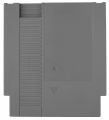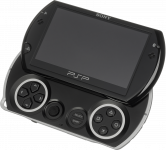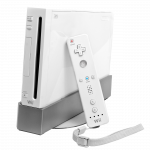Dimensions for Game Cartridges: Difference between revisions
CircuitSable (talk | contribs) m (Swap width and height of Neo Geo dimensions) |
|||
| (192 intermediate revisions by 7 users not shown) | |||
| Line 1: | Line 1: | ||
Cartridges were a popular medium for distributing video games in the early days of home consoles, and many retro gaming enthusiasts still collect and play games on original hardware. As such, it can be helpful to know the dimensions of cartridges used by popular consoles to aid in storage and display. This information can also be useful for those interested in creating custom storage solutions or designing gaming rooms. Additionally, the dimensions of cartridges could be useful for those interested in creating 3D printed replicas of classic games. Finally, game developers and programmers may also find this information useful for designing new cartridges for retro-inspired games. In this article, we will catalogue the dimensions of cartridges used by popular retro consoles. | |||
Consoles that did not use cartridge-based media may be displayed beside an N/A logo (Not Applicable), or an image of an optical disc, as applicable. Measurements should ideally be taken using a calliper tool, and confirmed by a member of wiki community, or a trustworthy source (See "Confirmed By" column). | |||
<gallery> | |||
Magnavox_Odyssey_Game_No_6.png | |||
NES-Cartridge.jpg | |||
SNES-SFAM-Cartridges.jpg | |||
</gallery> | |||
==First generation of consoles== | ==First generation of consoles== | ||
{| class="wikitable"|- | {| class="wikitable" | ||
|- | |||
! Console | ! Console | ||
! | ! Height (mm) | ||
! | ! Width (mm) | ||
! | ! Thickness (mm) | ||
! | ! Notes | ||
! | ! Confirmed by | ||
! | !colspan=2| Images | ||
|- | |- | ||
| [[Odyssey:Odyssey Mods Wiki|Original Magnavox Odyssey "Game Cards"]] | | [[Odyssey:Odyssey Mods Wiki|Original Magnavox Odyssey "Game Cards"]] | ||
| 60 | |||
| 100 | |||
| 5.5 | |||
| At the bottom of the game card, the width of the PCB is 90.5mm, expanding to just under 100mm width at the top of the handle. The height of the PCB portion is 26mm, and approx. 60mm in total (including the handle). The thickness of 5.5mm is at the thickest point (the handle). Note that the black molding is not exact between different cards so some deviation from these measurements can be expected. | |||
| [https://www.facebook.com/groups/372740913319548 Zach Horton & Brad Hartz (OdysseyNow)] | |||
|align=" | |align="center"|[[File:Magnavox_Odyssey_Game_No_6.png|150x150px]] | ||
|align=" | |align="center"|[[File:Magnavox_Odyssey.png|200x150px]] | ||
|- | |- | ||
| [https://forums.atariage.com/topic/275850-magnavox-odyssey-multicard/ Magnavox Odyssey Multicard] | | [https://forums.atariage.com/topic/275850-magnavox-odyssey-multicard/ Magnavox Odyssey Multicard] | ||
| 110 <ref>https://forums.atariage.com/topic/332013-does-any-place-make-or-sell-custom-cases-that-would-fit-this-magnavox-odyssey-multicard/#comment-5014407</ref> | |||
| 105 | |||
| 15 | |||
| 105mm wide and 15mm thick at widest/thickest point of the 3D printed handle. The PCB is 90mm wide. | |||
|align="left"| [ | |align="left"| [[User:TheRealOC|TheRealOC]] | ||
|align=" | |align="center"|[[File:FJo9S5LXEA0aiJq.jpg|150x150px]] | ||
|align=" | |align="center"|[[File:Magnavox_Odyssey.png|200x150px]] | ||
|- | |- | ||
| [[Odyssey:Odyssey_Series_Wiki|Magnavox Odyssey Series of Consoles]] | | [[Odyssey:Odyssey_Series_Wiki|Magnavox Odyssey Series of Consoles]] | ||
| N/A | |||
| N/A | |||
| N/A | |||
| The Odyssey Series of dedicated consoles were limited to a fixed number of built-in games and were not equipped for additional games that are distributed via ROM cartridges, discs, downloads or other digital media. | |||
|align="left"| [ | |align="left"| [[User:TheRealOC|TheRealOC]] | ||
|align="center"|[[File:NA.png| | |align="center"|[[File:NA.png|150x150px]] | ||
|align=" | |align="center"|[[File:Magnavox-Odyssey-2000-FL.jpg|200x150px]] | ||
|- | |- | ||
| TV Tennis Electrotennis (Epoch) | | TV Tennis Electrotennis (Epoch) | ||
| N/A | |||
| N/A | |||
| N/A | |||
| The Electrotennis was a dedicated console (i.e. with game(s) built in), which was not equipped for additional games that are distributed via ROM cartridges, discs, downloads or other digital media. | |||
|align="left"| [ | |align="left"| [[User:TheRealOC|TheRealOC]] | ||
|align="center"|[[File:NA.png| | |align="center"|[[File:NA.png|150x150px]] | ||
|align=" | |align="center"|[[File:TV_Tennis_Electrotennis.jpg|200x150px]] | ||
|- | |- | ||
| Atari Home Pong | | Atari Home Pong | ||
| N/A | |||
| N/A | |||
| N/A | |||
| Both models of Atari Home Pong (the C-100 and the C-140) were dedicated consoles, limited to a fixed number of built-in games and were not equipped for additional games that are distributed via ROM cartridges, discs, downloads or other digital media. | |||
|align="left"| [ | |align="left"| [[User:TheRealOC|TheRealOC]] | ||
|align="center"|[[File:NA.png| | |align="center"|[[File:NA.png|150x150px]] | ||
|align=" | |align="center"|[[File:S-l1600_(3).jpg|200x150px]] | ||
|- | |- | ||
| [[Telstar:Coleco_Telstar_Series_Mods_Wiki|Coleco Telstar Series]] | | [[Telstar:Coleco_Telstar_Series_Mods_Wiki|Coleco Telstar Series]] | ||
| N/A | |||
| N/A | |||
| N/A | |||
| The Coleco Telstar Series of dedicated consoles were limited to a fixed number of built-in games and were not equipped for additional games that are distributed via ROM cartridges, discs, downloads or other digital media. The one exception was the Coleco Telsar Arcade console. | |||
|align="left"| [ | |align="left"| [[User:TheRealOC|TheRealOC]] | ||
|align="center"|[[File:NA.png| | |align="center"|[[File:NA.png|150x150px]] | ||
|align=" | |align="center"|[[File:Coleco_Telstar_Deluxe.jpg|200x150px]] | ||
|- | |- | ||
| [[Telstar:Coleco_Telstar_Series_Mods_Wiki|Coleco Telstar Arcade cartridges]] | | [[Telstar:Coleco_Telstar_Series_Mods_Wiki|Coleco Telstar Arcade cartridges]] | ||
| ? | |||
| ? | |||
| ? | |||
| | | This could arguably be said to be the first "true" cartridge for a home gaming console. Whereas the earlier Magnavox Odyssey game cards merely turned on or off certain electronics inside the console (like a set of switches or jumpers), the Telstar Arcade cartridge actually contained small 512-word programs in ROM. The cartridge has a unique triangular shape which connects on the top of the Telstar Arcade console. | ||
| ? | |||
|align=" | |align="center"|[[File:Coleco_telstar_arcade_cartridge_(front).jpg|150x150px]] | ||
|align=" | |align="center"|[[File:Coleco-Telstar-Arcade-Pongside-L.jpg|200x150px]] | ||
|- | |- | ||
| Nintendo Color TV - Game 6 | | Nintendo Color TV - Game 6 | ||
| N/A | |||
| N/A | |||
| N/A | |||
| The Nintendo Color TV-Game Series of consoles were all dedicated consoles with games built-in; they were not equipped for additional games that are distributed via ROM cartridges, discs, downloads or other digital media. | |||
|align="left"| [ | |align="left"| [[User:TheRealOC|TheRealOC]] | ||
|align="center"|[[File:NA.png| | |align="center"|[[File:NA.png|150x150px]] | ||
|align=" | |align="center"|[[File:Nintendo-Color-TV-Game-Blockbreaker-FL.jpg|200x150px]] | ||
|} | |} | ||
==Second generation of consoles== | ==Second generation of consoles== | ||
{| class="wikitable"|- | {| class="wikitable" | ||
|- | |||
! Console | ! Console | ||
! | ! Height (mm) | ||
! | ! Width (mm) | ||
! | ! Thickness (mm) | ||
! | ! Notes | ||
! | ! Confirmed by | ||
! | !colspan=2| Images | ||
|- | |- | ||
| [[Atari_2600:Atari 2600 Mods Wiki|Atari 2600]] | | [[Atari_2600:Atari 2600 Mods Wiki|Atari 2600]] | ||
| | | 98 | ||
| | | 82 | ||
| | | 20 | ||
| ? | |||
| | | [[User:Black Majic|Black Majic]] ([[User talk:Black Majic|talk]]) | ||
|align=" | |align="center"|[[File:Atari_2600_cartridge.jpg|150x150px]] | ||
|align=" | |align="center"|[[File:Atari-2600.png|200x150px]] | ||
|- | |- | ||
| [[Atari 2600:Atari 2600 Mods Wiki|Sears Video Arcade II/Atari 2800]] | | [[Atari 2600:Atari 2600 Mods Wiki|Sears Video Arcade II/Atari 2800]] | ||
| | | ? | ||
| ? | |||
| ? | |||
| ? | |||
|align=" | | ? | ||
|align=" | |align="center"| ? | ||
|align="center"| ? | |||
|- | |- | ||
| Magnavox Odyssey 2 | | [[Odyssey2:Odyssey2 Mods Wiki|Magnavox Odyssey 2]] | ||
| 127 | |||
| 80 | |||
| 21 | |||
| The cartridges are in chunky plastic casings with a handle to make removal easier, and in Europe they were typically boxed in hard plastic cases with a combined manual and inlay providing cover art. | |||
| [https://www.reddit.com/r/gamecollecting/comments/23stkf/q_dimensions_for_game_cartridges/ Reddit User: gsx115] | |||
|align=" | |align="center"|[[File:Odyssey_2_cartridge_(front).jpg|150x150px]] | ||
|align=" | |align="center"|[[File:Odyssey_2_cartridge_(rear).jpg|200x150px]] | ||
|- | |- | ||
| Philips Videopac G7000 | | Philips Videopac G7000 (European release of the [[Odyssey2:Odyssey2 Mods Wiki|Magnavox Odyssey 2]]) | ||
| 127 | |||
| 80 | |||
| 21 | |||
| The cartridges for the PAL and NTSC versions of the console (Magnavox Odyssey 2 and Videopac G7000 respectively) are the same size and shape; anecdotally the Videopac carts have a more crisp casting (and possibly molding). | |||
The American Odyssey 2 cards have a more rounded-ness to the straight edge. It's possible the | The American Odyssey 2 cards have a more rounded-ness to the straight edge. It's possible the mould for the Odyssey 2 cards was made by taking a mould of one of the Videopac carts in much the same way we see similar sculpts degradation in other bootleg cards and toys. | ||
| [http://www.the-liberator.net Avon Fox (www.the-liberator.net)] | |||
|align=" | |align="center"|[[File:VideoPac_cartridge_(front).jpg|150x150px]] | ||
|align=" | |align="center"|[[File:VideoPac_cartridge_(rear).jpg|200x150px]] | ||
|- | |- | ||
| [[Intellivision:Intellivision_Mods_Wiki|Mattel Intellivision]] | | [[Intellivision:Intellivision_Mods_Wiki|Mattel Intellivision]] | ||
| | |rowspan=2| 88 | ||
| | |rowspan=2| 68 | ||
| | |rowspan=2| 16 | ||
|align=" | |rowspan=2| ? | ||
|align=" | |rowspan=2| [[User:Black Majic|Black Majic]] ([[User talk:Black Majic|talk]]) | ||
|align=" | |rowspan=2 align="center"| [[File:Intellivision Cartridge.png|frameless|150x150px]] | ||
|align="center"|[[File:Intellivision.png|200x150px]] | |||
|- | |||
| [[Intellivision:Intellivision_Mods_Wiki|Mattel Intellivision II]] | |||
|align="center"|[[File:Intellivision_II.png|200x150px]] | |||
|- | |- | ||
| Epoch Cassette Vision | | Epoch Cassette Vision | ||
| | | ? | ||
| ? | |||
| ? | |||
| ? | |||
|align=" | | ? | ||
|align=" | |align="center"| ? | ||
|align="center"|[[File:Epoch-Cassette-Vision-Console.jpg|200x150px]] | |||
|- | |- | ||
| [[ | | [[ColecoVision:ColecoVision Mods Wiki|Coleco ColecoVision]] | ||
| 87 | |||
| 81 | |||
| 19 | |||
| ? | |||
| [https://www.reddit.com/r/gamecollecting/comments/23stkf/q_dimensions_for_game_cartridges/ Reddit User: gsx115] | |||
|align="center"| [[File:ColecoVision Cartridge.jpg|frameless|150x150px]] | |||
|align="center"|[[File:ColecoVision.png|200x200px]] | |||
|align=" | |||
|- | |- | ||
| [[Atari_5200:Atari 5200 Mods Wiki|Atari 5200]] | | [[Atari_5200:Atari 5200 Mods Wiki|Atari 5200]] | ||
| 112 | |||
| 104 | |||
| 20 | |||
| ? | |||
| [https://www.reddit.com/r/gamecollecting/comments/23stkf/q_dimensions_for_game_cartridges/ Reddit User: gsx115] | |||
|align=" | |align="center"| ? | ||
|align="center"|[[File:Atari-5200.png|200x150px]] | |||
|- | |- | ||
| GCE/MB Vectrex | | GCE/MB Vectrex | ||
| | | 71,5 | ||
| | | 74,5 | ||
| | | 22,8 | ||
| All Cartridges for the original games looks the same from the outside. There are two main revisions of the cartridge interior plus two odd types used for specific releases. The two main revisions are the "normal" version used for most games and the made in Ireland versions. The normal version shell suspends the PCB by five pegs that corresponds to holes in the PCB and the two shell halves are held together by a single screw from the back, while the made in IRE shell was changed for cost savings probably. The IRE cartridges omitted the screw connection and the shell was instead glued shut. The IRE PCBs were significantly smaller than the normal ones and the PCB suspension was also changed so that the PCB had notches that would latch onto the thin and fragile front wall in the mouth of the shell (which breaks easily). The odd type shells were yet another type of shell with some minor differences used for the 3D Imager games and Mine Storm II and sometimes Pole Position. The last odd shell type was used for AnimAction because that PCB was much bigger and had more components so that shell is more hollow inside to make room for the larger PCB. | |||
|align=" | | ? | ||
|align="center"|[[File:Vectrex | |align="center"| ? | ||
|align="center"|[[File:Vectrex.png|236x236px]] | |||
|} | |} | ||
==Third generation of consoles== | ==Third generation of consoles== | ||
{| class="wikitable"|- | {| class="wikitable" | ||
|- | |||
! Console | ! Console | ||
! | ! Height (mm) | ||
! | ! Width (mm) | ||
! | ! Thickness (mm) | ||
! | ! Notes | ||
! | ! Confirmed by | ||
! | !colspan=2| Images | ||
|- | |- | ||
| [[NES:NES Mods Wiki|Nintendo Entertainment System (US)]] * | | [[NES:NES Mods Wiki|Nintendo Entertainment System (US)]] * | ||
| | |rowspan=2| 134 | ||
| | |rowspan=2| 120 | ||
| | |rowspan=2| 17 | ||
| | |rowspan=2| All officially licensed NTSC-U and PAL region cartridges are the same dimensions. Early NES Game Paks are held together with 5 small, slotted screws. | ||
| | |rowspan=2| [[User:Black Majic|Black Majic]] ([[User talk:Black Majic|talk]]) | ||
|align=" | |rowspan=2 align="center"|[[File:NES-Cartridge.jpg|150x150px]] | ||
|align=" | |align="center"|[[File:NES.png|200x150px]] | ||
|- | |- | ||
| [[NES:NES Mods Wiki|Nintendo Entertainment System (PAL)]] * | | [[NES:NES Mods Wiki|Nintendo Entertainment System (PAL)]] * | ||
|align=" | |align="center"|[[File:Neseuropean_version.jpg|200x150px]] | ||
|- | |- | ||
| [[NES:NES Mods Wiki|Famicom]] * | | [[NES:NES Mods Wiki|Famicom]] * | ||
| | | rowspan="2" | 108 | ||
| | | rowspan="2" | 71 | ||
| | | rowspan="2" | 17 | ||
| ? | |||
| [https://www.reddit.com/r/gamecollecting/comments/23stkf/q_dimensions_for_game_cartridges/ Reddit User: gsx115] | |||
|align=" | | rowspan="2" align="center" | [[File:Famicom Cartridge.jpg|frameless|136x136px]] | ||
|align="center"|[[File:Famicom.png|200x150px]] | |||
|- | |- | ||
| [[NES:NES Mods Wiki|AV Famicom]] * | | [[NES:NES Mods Wiki|AV Famicom]] * | ||
| ? | |||
| ? | |||
|align="center"|[[File:AVFamicom.png|200x150px]] | |||
|align=" | |||
|- | |- | ||
| [[NES:NES Mods Wiki|Famicom Disk System]] * | | [[NES:NES Mods Wiki|Famicom Disk System]] * | ||
| | | ? | ||
| | | ? | ||
| ? | |||
|align=" | | ? | ||
|align=" | | ? | ||
| | |align="center"| ? | ||
|align="center"| [[File:DiskSystem.png|frameless|189x189px]] | |||
|- | |- | ||
| [[NES:NES Mods Wiki|Twin Famicom]] * | | [[NES:NES Mods Wiki|Twin Famicom]] * | ||
| | | ? | ||
| ? | |||
| ? | |||
| ? | |||
|align=" | | ? | ||
|align=" | |align="center"| ? | ||
|align="center"|[[File:TurboTwinFamicom.png|200x150px]] | |||
|- | |- | ||
| [[SG-1000:SG-1000 Mods Wiki|Sega SG-1000]] * | | [[SG-1000:SG-1000 Mods Wiki|Sega SG-1000]] * | ||
| | | ? | ||
| ? | |||
| ? | |||
| ? | |||
|align=" | | ? | ||
|align=" | |align="center"| ? | ||
|align="center"|[[File:SG-1000.png|200x150px]] | |||
|- | |- | ||
| [https://sc3000-multicart.com/megacart.htm SG-1000 Multicart (Survivors MegaCart)] | | [https://sc3000-multicart.com/megacart.htm SG-1000 Multicart (Survivors MegaCart)] | ||
| 106 | |||
| 82 | |||
| 20 | |||
| ? | |||
|align="left"| [ | |align="left"| [[User:TheRealOC|TheRealOC]] | ||
|align=" | |align="center"|[[File:Sega_SG-1000_multicart.jpg|150x150px]] | ||
|align=" | |align="center"|[[File:SG-1000.png|200x150px]] | ||
|- | |- | ||
| [[Master_System:Master System Mods Wiki|Sega Mark III]] * | | [[Master_System:Master System Mods Wiki|Sega Mark III]] * | ||
| | | ? | ||
| ? | |||
| ? | |||
| ? | |||
|align=" | | ? | ||
|align=" | |align="center"| ? | ||
|align="center"|[[File:MarkIII.png|200x150px]] | |||
|- | |- | ||
| [[Master_System:Master System Mods Wiki|Sega Master System]] | | [[Master_System:Master System Mods Wiki|Sega Master System]] Cartridge | ||
| | | 69 | ||
| | | 108 | ||
| | | 16 | ||
| | | ? | ||
|align=" | | [[User:Bomb Bloke|Bomb Bloke]] | ||
|align=" | |align="center"|[[File:Master System Cartridge.png|150x150px]] | ||
|align="center"|[[File:SMS.png|200x150px]] | |||
|- | |- | ||
| [[Master_System:Master System Mods Wiki|Sega Master System (JP, MK-2000)]] * | | [[Master_System:Master System Mods Wiki|Sega Master System (JP, MK-2000)]] * | ||
| | | ? | ||
| ? | |||
| ? | |||
| ? | |||
|align=" | | ? | ||
|align=" | |align="center"| ? | ||
|align="center"| ? | |||
|- | |- | ||
| [[Atari 7800:Atari 7800 Mods Wiki|Atari 7800]] | | [[Atari 7800:Atari 7800 Mods Wiki|Atari 7800]] | ||
| 87 | |||
| 81 | |||
| 19 | |||
| ? | |||
| [https://www.reddit.com/r/gamecollecting/comments/23stkf/q_dimensions_for_game_cartridges/ Reddit User: gsx115] | |||
|align=" | |align="center"| ? | ||
|align="center"|[[File:Atari-7800.png|200x150px]] | |||
|- | |- | ||
| Casio PV-1000 * | | Casio PV-1000 * | ||
| | | ? | ||
| ? | |||
| ? | |||
| ? | |||
|align=" | | ? | ||
|align=" | |align="center"| ? | ||
|align="center"|[[File:Casio-PV1000-Console-Set.jpg|200x150px]] | |||
|- | |- | ||
| Epoch Super Cassette Vision * | | Epoch Super Cassette Vision * | ||
| | | ? | ||
| ? | |||
| ? | |||
| ? | |||
|align=" | | ? | ||
|align=" | |align="center"| ? | ||
|align="center"| ? | |||
|- | |- | ||
| Amstrad GX4000 * | | Amstrad GX4000 * | ||
| | | ? | ||
| ? | |||
| ? | |||
| ? | |||
|align=" | | ? | ||
|align=" | |align="center"| ? | ||
|align="center"|[[File:Amstrad-GX4000-Console-Set.jpg|200x150px]] | |||
|} | |} | ||
==Fourth generation of consoles== | ==Fourth generation of consoles== | ||
{| class="wikitable"|- | {| class="wikitable" | ||
|- | |||
! Console | ! Console | ||
!align="left"| | ! Height (mm) | ||
! Width (mm) | |||
! Thickness (mm) | |||
! Notes | |||
! Confirmed by | |||
!colspan=2| Images | |||
|- | |||
| [[Lynx:Lynx_Mods_Wiki|Atari Lynx]] | |||
| 61 | |||
| 58 | |||
| 2.4/16 | |||
| ? | |||
| karri<ref>https://forums.atariage.com/topic/240309-what-are-the-measurements-of-the-cartridges-for-the-lynx/#comment-3273491</ref> | |||
|align="center"| [[File:Lynx Cartridge Curved.jpg|frameless|150x150px]] | |||
|align="center"|[[File:Atari-Lynx.png|200x150px]] | |||
|- | |||
| [[TG16:TurboGrafx-16 Mods Wiki|NEC TurboGrafx-16]] HuCard/TurboChip | |||
| 84 | |||
| 53 | |||
| 2 | |||
| ? | |||
|align="left"| [[User:ApolloBoy|ApolloBoy]] | |||
|align="center"|[[File:TG16_HuCard_(front).jpg|200x200px]] | |||
|align="center"|[[File:TG16_HuCard_(rear).jpg|200x200px]] | |||
|- | |||
| Standard [[TG16:TurboGrafx-16 Mods Wiki|PC Engine]] HuCard | |||
| 84 | |||
| 53 | |||
| 2 | |||
| Most PC Engine HuCards are physically identical to their TG-16 counterparts but have a different pinout | |||
|align="center"| [https://www.reddit.com/r/gamecollecting/comments/23stkf/q_dimensions_for_game_cartridges/ Reddit User: gsx115] | |||
|align="center"|[[File:PC_Engine_HuCard_(front).jpg|200x200px]] | |||
|align="center"|[[File:PC_Engine_HuCard_(back).jpg|200x200px]] | |||
|- | |||
| [[TG16:TurboGrafx-16 Mods Wiki|NEC PC Engine SuperGrafx]] HuCard | |||
| 84 | |||
| 53 | |||
| 2 | |||
| Same as the PC Engine but the label is flipped around as HuCards are loaded into the rear of the console | |||
|align="left"| [[User:ApolloBoy|ApolloBoy]] | |||
|align="center"|[[File:SuperGrafx_HuCard_(front).jpg|183x183px]] | |||
|align="center"|[[File:SuperGrafx_HuCard_(rear).jpg|166x166px]] | |||
|- | |||
| System Card (v1.0) for the: | |||
|rowspan=2| 84 | |||
|rowspan=2| 53 | |||
|rowspan=2| 2 | |||
|rowspan=2| The PC Engine CD add-on uses disc-based physical media, however a special HuCard called the "PC Engine CD System Card (v1.0)" is required to provide the unit's OS. The 3.0 system card and Arcade Card Pro add additional RAM in addition to the OS. | |||
|rowspan=2| [[User:ApolloBoy|ApolloBoy]] / [https://www.youtube.com/@supermegagrafx64 Cyrus Martin] | |||
|rowspan=2 align="center"|[[File:System_Card_(v1.0).png|250x250px]] | |||
|align="center"|[[File:PCEngineCDROM.jpg|200x150px]] | |||
|- | |- | ||
| [[ | | [[TG16:TurboGrafx-16 Mods Wiki|NEC PC Engine CD]] | ||
|align=" | |align="center"|[[File:Optical_disc_icon_(public_domain).png|200x150px]] | ||
| | |||
|- | |- | ||
| | | System Card (v2.0) for the: | ||
| | |rowspan=2| 84 | ||
| | |rowspan=2| 53 | ||
| | |rowspan=2| 2 | ||
| | |rowspan=2| The TurboGrafx-CD add-on uses disc-based physical media, however a special Turbochip card called the "TurboGrafx CD System Card" (version 2.0) is required to provide the unit's OS as well as additional RAM. | ||
| | |rowspan=2| [[User:ApolloBoy|ApolloBoy]] / [https://www.youtube.com/@supermegagrafx64 Cyrus Martin] | ||
|align=" | |rowspan=2 align="center"|[[File:System_Card_(v2.0).png|216x216px]] | ||
|align="center"|[[File:TurboGrafxCD.png|200x150px]] | |||
|- | |- | ||
| [[TG16:TurboGrafx-16 Mods Wiki| | | [[TG16:TurboGrafx-16 Mods Wiki|NEC TurboGrafx-CD]] | ||
|align=" | |align="center"|[[File:Optical_disc_icon_(public_domain).png|200x150px]] | ||
| | |||
|- | |- | ||
| | | Super System Card (v3.0) for the: | ||
| | |rowspan=2| 84 | ||
| | |rowspan=2| 53 | ||
| | |rowspan=2| 2 | ||
| | |rowspan=2| When NEC started using the Super CD format, they released an upgraded version 3.0 Super System Card. This also is meant to be plugged into the American TurboGrax-16, allowing the TurboGrax-CD unit to play the 2MB upgraded Super CD games, as well as the the regular TurboGrafx-CD games. | ||
|align=" | Note: The Super System (v3.0) is pre-built into the TurboDuo consoles, so the separate card is not required by these systems to play 1.0, 2.0 or 3.0 CD games. | ||
|align=" | |rowspan=2| [[User:ApolloBoy|ApolloBoy]] / [https://www.youtube.com/@supermegagrafx64 Cyrus Martin] | ||
|rowspan=2 align="center"|[[File:Super_System_Card_(v3.0).jpg|193x193px]] | |||
|align="center"|[[File:TurboGrafxCD.png|200x150px]] | |||
|- | |- | ||
| [[TG16:TurboGrafx-16 Mods Wiki|NEC TurboGrafx-CD]] | | [[TG16:TurboGrafx-16 Mods Wiki|NEC TurboGrafx-CD]] | ||
|align=" | |align="center"|[[File:Optical_disc_icon_(public_domain).png|200x150px]] | ||
|- | |- | ||
| [[TG16:TurboGrafx-16 Mods Wiki|NEC | | Street Fighter 2 Hucard for the [[TG16:TurboGrafx-16 Mods Wiki|PC Engine]] | ||
|align=" | | 84 | ||
|align=" | | 53 | ||
|align=" | | 2 | ||
|align=" | | Street Fighter II for the PC Engine system, was produced on a 20Mbits cartridge, making it the largest HuCard game ever created. It was also physically larger than standard Hucards (the footprint is the same but the black end is raised. Other later carts copied this style and had different sized black areas but this did not affect the overall size of the card. | ||
|align=" | |||
|align=" | Continuing to produce similar arcade ports for the PC Engine created the impetus for creating the Arcade System Card. | ||
|align="center"| [https://www.youtube.com/@supermegagrafx64 Cyrus Martin] | |||
|align="center"|[[File:SF2_Hucard.jpg|200x150px]] | |||
|align="center"|[[File:PC-Engine.png|200x150px]] | |||
|- | |||
| Arcade System Card (Duo Version) for: | |||
[[TG16:TurboGrafx-16 Mods Wiki|NEC TurboDuo/PC Engine Duo]], | |||
|rowspan=3| 84 | |||
|rowspan=3| 53 | |||
|rowspan=3| 2 | |||
|rowspan=3| To achieve high-quality ports of arcade fighting games, more RAM was needed and so NEC created a system card capable of providing it. This was called the “Arcade System Card”. There were two different versions – the Duo version and the Pro version (which was designed in case the user didn’t have a Duo). | |||
|rowspan=3| [https://www.youtube.com/@supermegagrafx64 Cyrus Martin] | |||
|rowspan=3 align="center"|[[File:Arcade_System_Card.PNG|210x210px]] | |||
|align="center"|[[File:TurboDuo.png|200x150px]] | |||
|- | |||
| [[TG16:TurboGrafx-16 Mods Wiki|NEC PC Engine Duo-R/Duo-RX]] | |||
|align="center"|[[File:DuoR.png|200x150px]] | |||
|- | |||
| and [[TG16:TurboGrafx-16 Mods Wiki|NEC Super CD-ROM2]] | |||
|align="center"|[[File:SuperCDROM2.jpg|200x150px]] | |||
|- | |||
| Arcade System Card (Pro Version) for the: | |||
[[TG16:TurboGrafx-16 Mods Wiki|PC Engine]] | |||
|rowspan=2| 84 | |||
|rowspan=2| 53 | |||
|rowspan=2| 2 | |||
|rowspan=2| To achieve high-quality ports of arcade fighting games, more RAM was needed and so NEC created a system card capable of providing it. This was called the “Arcade System Card”. There were two different versions – the Duo version and the Pro version (which was designed in case the user didn’t have a Duo) | |||
|rowspan=2| [[User:ApolloBoy|ApolloBoy]] / [https://www.youtube.com/@supermegagrafx64 Cyrus Martin] | |||
|rowspan=2 align="center"|[[File:Arcade_System_Card_(Pro_Version).jpg|233x233px]] | |||
|align="center"|[[File:PC-Engine.png|200x150px]] | |||
|- | |||
| and [[TG16:TurboGrafx-16 Mods Wiki|NEC Super CD-ROM2]] | |||
|align="center"|[[File:SuperCDROM2.jpg|200x150px]] | |||
|- | |- | ||
| [[TG16:TurboGrafx-16 Mods Wiki|NEC TurboExpress/PC Engine GT]] | | [[TG16:TurboGrafx-16 Mods Wiki|NEC TurboExpress/PC Engine GT]] | ||
| | | 84 | ||
| | | 53 | ||
|align=" | | 2 | ||
|align=" | | The NEC TurboExpress/PC Engine GT are not unique consoles with their own dedicated games library. Rather they are miniaturized versions of the existing TurboGrafx-16 and PC Engine consoles, and uses the same TurboChips and HuCards respectively. | ||
|align=" | |align="center"| [https://www.youtube.com/watch?v=q27EQHmDnhM RifeXD (YouTube)] | ||
| | |align="center"|[[File:TG16_HuCard_(front).jpg|200x200px]] | ||
|align="center"|[[File:TurboExpress.png|200x150px]] | |||
|- | |- | ||
| [[TG16:TurboGrafx-16 Mods Wiki|NEC TurboDuo/PC Engine Duo]] | | [[TG16:TurboGrafx-16 Mods Wiki|NEC TurboDuo/PC Engine Duo]] | ||
| | | 84 | ||
| | | 53 | ||
|align="left"| | | 2 | ||
|align=" | | The TurboDuo integrates the capabilities of the TurboGrafx-16 and the TurboGrafx-CD) into a single, redesigned unit. The PC Engine Duo does the same for the Japanese PC Engine and the Super CD-ROM2. | ||
|align=" | However, neither the TurboDuo nor PC Engine Duo any additional hardware on the TurboChip/HuCard side - standard TurboChips/HuCards are used in the US and Japanese versions, respectively. | ||
|align="left"| [[User:ApolloBoy|ApolloBoy]] | |||
|align="center"|[[File:TG16_HuCard_(front).jpg|200x200px]] | |||
|align="center"|[[File:TurboDuo.png|200x150px]] | |||
|- | |- | ||
| [[TG16:TurboGrafx-16 Mods Wiki|NEC Super CD-ROM2]] | | [[TG16:TurboGrafx-16 Mods Wiki|NEC Super CD-ROM2]] | ||
| | | N/A | ||
| | | N/A | ||
|align="left"| | | N/A | ||
|align=" | | Console uses disc-based physical media | ||
|align=" | |align="left"| [[User:ApolloBoy|ApolloBoy]] | ||
|align="center"|[[File:Optical_disc_icon_(public_domain).png|150x150px]] | |||
|align="center"|[[File:SuperCDROM2.jpg|200x150px]] | |||
|- | |- | ||
| [[TG16:TurboGrafx-16 Mods Wiki|NEC PC Engine LT]] | | [[TG16:TurboGrafx-16 Mods Wiki|NEC PC Engine LT]] | ||
| | | 84 | ||
| | | 53 | ||
|align="left"| | | 2 | ||
|align=" | | Similarly to the PC Engine GT, the PC Engine LT uses the same HuCards as a standard Japanese PC Engine home console (the LT was released exclusively in Japan, and does not support American TurboChips). The LT did not receive any of its own unique HuCard titles. | ||
|align=" | |align="left"| [[User:ApolloBoy|ApolloBoy]] | ||
|align="center"|[[File:PC_Engine_HuCard_(front).jpg|200x200px]] | |||
|align="center"|[[File:PC_Engine_LT.jpg|188x188px]] | |||
|- | |- | ||
| [[TG16:TurboGrafx-16 Mods Wiki|NEC PC Engine Duo-R/Duo-RX]] | | [[TG16:TurboGrafx-16 Mods Wiki|NEC PC Engine Duo-R/Duo-RX]] | ||
| | | 84 | ||
| | | 53 | ||
| | | 2 | ||
|align=" | | The Duo-R and Duo-RX are Japan-only cost reduced models of the PC Engine Duo. Again, they both use standard HuCards. | ||
|align=" | | [https://consolemods.org/wiki/User:Zaxour Zaxour] | ||
|align="center"|[[File:PC_Engine_HuCard_(front).jpg|200x200px]] | |||
|align="center"|[[File:DuoR.png|200x150px]] | |||
|- | |- | ||
| Standard Sega Mega Drive Japanese Cartridges | | Standard [[Genesis:Genesis Mods Wiki|Sega Mega Drive]] Japanese Cartridges | ||
| 67 | |||
| 93 | |||
| 17 | |||
| The PCBs are always ~83 mm since the receiver is around 85 mm. Japanese carts have a rectangular footprint 93 mm wide, 67 mm tall, 17 mm thick with rounded edges; the top and sides of the cart are also rounded, with the left side of the cart having an indentation (for locking the cart while the console is powered). | |||
| [https://www.youtube.com/@NagaTen NagaTen] | |||
|align=" | |align="center"|[[File:Standard_Japanese_MegaDrive_cartridge.png|150x150px]] | ||
|align=" | |align="center"|[[File:JP Mega Drive Model 1.png|200x200px]] | ||
|- | |- | ||
| Standard PAL Sega Mega Drive Cartridges | | Standard PAL [[Genesis:Genesis Mods Wiki|Sega Mega Drive]] Cartridges | ||
| | |rowspan=2| 70 | ||
| | |rowspan=2| 109 | ||
| | |rowspan=2| 17 | ||
| | |rowspan=2| Genesis and PAL Mega Drive carts share the same mold; their footprint goes from a rectangular 95 mm wide shape and widens into 108 mm with rounded sides, 67 mm tall and 17 mm thick, with chamfered edges. Only the sides of the cart are rounded, with the top being being flat, and there is no indentation since consoles outside Japan don't have a cart locking mechanism. | ||
| | |rowspan=2| [https://www.youtube.com/@NagaTen NagaTen] | ||
|align=" | |align="center"|[[File:Standard_PAL_MegaDrive_cartridge.png|150x150px]] | ||
|align=" | |align="center"|[[File:Sega-Mega-Drive-EU-Mk1-wController-FL.png|200x200px]] | ||
|- | |- | ||
| Standard NTSC | | Standard NTSC [[Genesis:Genesis Mods Wiki|Sega Genesis]] Cartridges | ||
|align="center"|[[File:Standard_NTSC_Genesis_cartridge.png|150x150px]] | |||
|align="center"|[[File:Genesis Model 1.png|200x200px]] | |||
|align=" | |||
|align=" | |||
|- | |- | ||
| Sega Genesis | | [[Genesis:Genesis Mods Wiki|Sega Genesis/Mega Drive]] Virtua Racing Cartridge | ||
| | | 108 | ||
| | | 109 | ||
| 17 | |||
| | | rowspan="2" | ? | ||
| | | [[User:Black Majic|Black Majic]] ([[User talk:Black Majic|talk]]) | ||
|align=" | |align="center"|[[File:NTSC Virtua Racing.jpg|frameless|150x150px]] | ||
|align=" | |align="center"|[[File:PAL Virtua Racing.jpg|frameless|150x150px]] | ||
|- | |- | ||
| Sega Genesis | | [[Genesis:Genesis Mods Wiki|Sega Genesis]] Acclaim Cartridges | ||
| | | 67 | ||
| 95/108 | |||
| 17 | |||
| [https://www.youtube.com/@AdamKoralik Adam Koralik] | |||
|align="center"|[[File:Akklaim_cartridge_(rear).png|150x150px]] | |||
|align=" | |align="center"|[[File:Genesis Model 1.png|200x200px]] | ||
|align=" | |||
|- | |- | ||
| | | [[Genesis:Genesis Mods Wiki|Sega Genesis]] EA (Electronic Arts) Cartridges | ||
| | | 88 | ||
| | | 95 | ||
| | | 17 | ||
| | | Electronic Arts reverse-engineered the Genesis and produced their own (taller) carts, which were notable for the large indentation with a yellow plastic section with the EA logo molded onto it. Cartridges have flat edges at the bottom, a flat top and chamfered/slightly rounded sides. | ||
| [https://www.youtube.com/@NagaTen NagaTen] | |||
|align=" | |align="center"|[[File:Sega_Genesis_EA_cartridge.png|150x150px]] | ||
|align=" | |align="center"|[[File:EA_cartridge_side_view.png|200x150px]] | ||
|- | |- | ||
| Standard Sega | | Standard [[Genesis:Genesis Mods Wiki|Sega 32X]] PAL Cartridge | ||
| | |rowspan=3| 111 | ||
| | |rowspan=3| 72 | ||
| | |rowspan=3| 16 | ||
| | |rowspan=3| Aside from text which is written into the mold, 32X carts share the same mold; the design is consistent across all regions. Unlike the Japanese Mega Drive there is no cartridge lock, but there are also no end labels. | ||
| | |rowspan=3| [https://www.reddit.com/r/gamecollecting/comments/23stkf/q_dimensions_for_game_cartridges/ Reddit User: gsx115] | ||
|align=" | |align="center"|[[File:Standard_Sega_32x_PAL_Cartridge.png|150x150px]] | ||
|align=" | |align="center"|[[File:Sega_32X.png|200x150px]] | ||
|- | |- | ||
| | | Standard [[Genesis:Genesis Mods Wiki|Sega 32X]] NTSC-U Cartridge | ||
|align="center"|[[File:Standard_Sega_32x_NTSC_Cartridge.png|150x150px]] | |||
|align="center"|[[File:Sega_32X.png|200x150px]] | |||
|align=" | |||
|align=" | |||
|- | |- | ||
| Sega | | Standard [[Genesis:Genesis Mods Wiki|Sega 32X]] NTSC-J Cartridge | ||
|[[File:32X Japanese Cartridge.png|frameless|150x150px]] | |||
|align="center"|[[File:Sega_32X.png|200x150px]] | |||
|align=" | |||
|- | |- | ||
| Sega | | [[Genesis:Genesis Mods Wiki|Sega Mega Drive]] Codemasters Cartridge | ||
| 75 | |||
| 98/65 | |||
| 17 | |||
| | | Codemasters cartridge (without controller ports) are 98mm wide at the bottom, tapering away to 65mm at the top. These carts have flat edges, a flat top and rounded sides. | ||
| [https://www.youtube.com/@NagaTen NagaTen] | |||
|align=" | |align="center"|[[File:Codemasters_Sega_Mega_Drive_Cartridge.png|150x150px]] | ||
|align=" | |align="center"|[[File:Sega-Mega-Drive-EU-Mk1-wController-FL.png|200x200px]] | ||
|- | |- | ||
| Sega Genesis | | [[Genesis:Genesis Mods Wiki|Sega Mega Drive]] Codemasters "J-Cart" Cartridge (with controller ports) | ||
|align=" | |rowspan=2| 75 | ||
|align=" | |rowspan=2| 98/65 | ||
|align=" | |rowspan=2| 17 | ||
|align=" | |rowspan=2| J-Carts are exactly the same as standard Codemasters cartridges, but with two front-facing 9-pin controller ports labelled "Control 3" and "Control 4". Genesis version is identical to PAL version. | ||
|rowspan=2| [https://www.youtube.com/@NagaTen NagaTen], [https://www.youtube.com/@AdamKoralik Adam Koralik] | |||
|align="center"|[[File:Codemasters_Sega_Mega_Drive_Cartridge_with_Controller_ports.png|150x150px]] | |||
|align="center"|[[File:Sega-Mega-Drive-EU-Mk1-wController-FL.png|200x200px]] | |||
|- | |||
| [[Genesis:Genesis Mods Wiki|Sega Genesis]] Codemasters "J-Cart" Cartridge (with controller ports) | |||
|align="center"|[[File:Sega_Genesis_J_Cart_(front_view).png|150x150px]] | |||
|align="center"|[[File:Sega_Genesis_J_Cart_(rear_view).png|200x150px]] | |||
|- | |||
| [[Genesis:Genesis Mods Wiki|Sega Genesis/Mega Drive]] Sonic and Knuckles cartridge | |||
| 84 (incl. cover) | |||
| 121.65 (at hinges) | |||
| 22 | |||
| "Sonic 3" and "Sonic & Knuckles" were originally conceived as a single game, however ROM size constraints meant that the game had to be split into two separate parts. The "Sonic & Knuckles" cart was used for all regions, and is an identical shape to a standard PAL Mega Drive/Genesis cartridge at the bottom (with a "cut" on the left side of the cart for compatibility with the Japanese cart-locking mechanism). | |||
However, the top of the cart has a swiveling cover called a "Lock-On Adapter", which allows the player to connect another cartridge on top. The footprint of the cartridge goes from a 95mm wide shape and widens into 116mm at the top, while the thickness goes from 17mm to 22mm. | However, the top of the cart has a swiveling cover called a "Lock-On Adapter", which allows the player to connect another cartridge on top. The footprint of the cartridge goes from a 95mm wide shape and widens into 116mm at the top, while the thickness goes from 17mm to 22mm. | ||
| | | [[User:Black Majic|Black Majic]] ([[User talk:Black Majic|talk]]) | ||
|align=" | |align="center"|[[File:Sega_Genesis_Sonic_and_Knuckles_cartridge.png|150x150px]] | ||
|align=" | |align="center"|[[File:Sonic_and_knuckles_pic_3_(resized).png|200x150px]] | ||
|- | |- | ||
| Mega Key region converter cartridge | | Mega Key region converter cartridge | ||
| 67 | |||
| 95/108 | |||
| 17 | |||
| This is an unofficial region bypass cartridge that uses DIP switches to convert cartridges from any region (USA/Japan/Brazil/PAL+SECAM) to work with a Sega Genesis/Mega Drive console from any region. As with standard cartridges, the Mega Key footprint goes from a rectangular 95 mm wide shape and widens into 108 mm. | |||
The cartridge being converted would sit on top of an adapter which is 87 mm wide and 9 mm thick. The Mega Key cart itself is 67 mm tall, but 127 mm with a regular cart on top. Despite the grey area around the concept of the cart, this was actually officially distributed in Portugal, by Ecofilmes (see Wikipedia @ shorturl.at/sDEFJ) | |||
The cartridge being converted would sit on top of an adapter which is | | [https://www.youtube.com/@NagaTen NagaTen] | ||
|align="center"|[[File:Mega_Key_(Front_view).png|150x150px]] | |||
|align=" | |align="center"|[[File:Mega_Key_in_use.png|200x150px]] | ||
|align=" | |||
|- | |- | ||
| [[Game Gear:Game Gear Mods Wiki|Sega Game Gear]] * | | [[Game Gear:Game Gear Mods Wiki|Sega Game Gear]] * | ||
| 68 | |||
| 66 | |||
| 10 | |||
| ? | |||
| [https://www.reddit.com/r/gamecollecting/comments/23stkf/q_dimensions_for_game_cartridges/ Reddit User: gsx115] | |||
|align=" | |align="center"| [[File:Sega-game-gear-Shining-Force.jpg|frameless|150x150px]] | ||
|align="center"|[[File:Game_Gear.png|200x150px]] | |||
|- | |- | ||
| [[Game Boy:Game Boy Mods Wiki|Nintendo Game Boy]] | | [[Game Boy:Game Boy Mods Wiki|Nintendo Game Boy]] | ||
| | |rowspan=2| 65 | ||
| | |rowspan=2| 57 | ||
| | |rowspan=2| 7.8 | ||
| | |rowspan=2| ? | ||
|align=" | |rowspan=2| [[User:Black Majic|Black Majic]] ([[User talk:Black Majic|talk]]) | ||
|align=" | |rowspan=2 align="center"|[[File:Game Boy Cartridge.png|150x150px]] | ||
|align="center"|[[File:Game_Boy.png|200x150px]] | |||
|- | |- | ||
| [[Game Boy:Game Boy Mods Wiki|Nintendo Game Boy Pocket]] | | [[Game Boy:Game Boy Mods Wiki|Nintendo Game Boy Pocket]] | ||
|align=" | |align="center"|[[File:Game Boy Pocket.png|200x150px]] | ||
| | |||
|- | |- | ||
| [[SNES:SNES Mods Wiki|Super Nintendo (US)]] | | [[SNES:SNES Mods Wiki|Super Nintendo (US)]] | ||
| | | 87.7 | ||
| | | 135.85 | ||
| | | 19.7 | ||
|align=" | | ? | ||
| | | [[User:Black Majic|Black Majic]] ([[User talk:Black Majic|talk]]) | ||
|align=" | |align="center"| [[File:Snes NTSC Blank.jpg|frameless|150x150px]] | ||
|align="center"|[[File:SNES.png|200x150px]] | |||
|- | |- | ||
| [[SNES:SNES Mods Wiki|Super Famicom]] | | [[SNES:SNES Mods Wiki|Super Famicom]] | ||
| | |rowspan=2| 86 | ||
| | |rowspan=2| 127 | ||
| | |rowspan=2| 20 | ||
| | |rowspan=2| PAL and Japanese cartridge casings are identical, with the exception of the base from which the PCB protrudes. | ||
|align=" | |rowspan=2| [[User:Bomb Bloke|Bomb Bloke]] | ||
|align=" | |rowspan=2 align="center"|[[File:SNES Cartridge (PAL).png|150x150px]] | ||
|align="center"|[[File:Super Famicom.png|200x150px]] | |||
|- | |- | ||
| [[SNES:SNES Mods Wiki|Super Nintendo (PAL)]] * | | [[SNES:SNES Mods Wiki|Super Nintendo (PAL)]] * | ||
|align=" | |align="center"|[[File:SNES Jr Europe.png|200x150px]] | ||
|- | |||
| | | [[Neo_Geo:Neo_Geo_Mods_Wiki|SNK Neo Geo AES]] | ||
| 146.05 | |||
| 190.5 | |||
| | |31.75 | ||
| ? | |||
| SNK Neo Geo AES | |align="center"| [https://www.reddit.com/r/gamecollecting/comments/23stkf/comment/ju905l1/?utm_source=share&utm_medium=web2x&context=3 Reddit User: protocephalon] | ||
| | |align="center"|[[File:Neo-Geo-AES-Cartridge-Bottom.jpg|150x150px]] | ||
| | |align="center"| [[File:Neo-Geo-AES-Console-Set.png|200x150px]] | ||
|align=" | |||
|align=" | |||
|align=" | |||
| | |||
|- | |- | ||
| SNK Neo Geo CD | | [[Neo_Geo:Neo_Geo_Mods_Wiki|SNK Neo Geo CD]] | ||
| N/A | |||
| N/A | |||
| N/A | |||
| Console uses disc-based physical media | |||
| ? | |||
|align="center"|[[File:Optical_disc_icon_(public_domain).png| | |align="center"|[[File:Optical_disc_icon_(public_domain).png|150x150px]] | ||
|align=" | |align="center"|[[File:Neo-Geo-CD-TopLoader-wController-FL.png|200x150px]] | ||
|- | |- | ||
| Pioneer LaserActive | | [[LaserActive:LaserActive_Mods_Wiki|Pioneer LaserActive]] | ||
| | | N/A | ||
| | | N/A | ||
| | | N/A | ||
| | | Console uses laserdisc-based physical media. However Pioneer and Sega released an add-on PAC (the Mega LD PAC) that allows player to play 8-inch and 12-inch LaserActive Mega LD discs, in addition to standard Sega CD discs and Genesis cartridges, as well as CD+G discs. | ||
| ? | |||
|align="center"|[[File:Optical_disc_icon_(public_domain).png| | |align="center"|[[File:Optical_disc_icon_(public_domain).png|150x150px]] | ||
|align=" | |align="center"|[[File:LaserActive.png|200x150px]] | ||
|} | |} | ||
==Fifth generation of consoles== | ==Fifth generation of consoles== | ||
{| class="wikitable"|- | {| class="wikitable" | ||
|- | |||
! Console | ! Console | ||
! | ! Height (mm) | ||
! | ! Width (mm) | ||
! | ! Thickness (mm) | ||
! | ! Notes | ||
! | ! Confirmed by | ||
! | !colspan=2| Images | ||
|- | |- | ||
| Commodore Amiga CD32 | | Commodore Amiga CD32 | ||
| N/A | |||
| N/A | |||
| N/A | |||
| Console uses disc-based physical media | |||
|align="left"| [ | |align="left"| [[User:TheRealOC|TheRealOC]] | ||
|align="center"|[[File:Optical_disc_icon_(public_domain).png| | |align="center"|[[File:Optical_disc_icon_(public_domain).png|150x150px]] | ||
|align=" | |align="center"|[[File:CD32.png|200x200px]] | ||
|- | |- | ||
| [[3DO:3DO Mods Wiki|Panasonic 3DO]] | | [[3DO:3DO Mods Wiki|Panasonic 3DO]] | ||
| N/A | |||
| N/A | |||
| N/A | |||
| Console uses disc-based physical media | |||
|align="left"| [ | |align="left"| [[User:TheRealOC|TheRealOC]] | ||
|align="center"|[[File:Optical_disc_icon_(public_domain).png| | |align="center"|[[File:Optical_disc_icon_(public_domain).png|150x150px]] | ||
|align=" | |align="center"|[[File:Panasonic_3DO_FZ-1.png|200x150px]] | ||
|- | |- | ||
| [[Jaguar:Jaguar Mods Wiki|Atari Jaguar]] * | | [[Jaguar:Jaguar Mods Wiki|Atari Jaguar]] * | ||
| | | 88.4 | ||
| | | 108.0 | ||
| 19.5 (max) | |||
| | | ? | ||
|align=" | | Zerosquare<ref>https://forums.atariage.com/topic/347627-atari-jaguar-cartridge-dimensions/</ref> | ||
| | |align="center"| [[File:Jagcart.png|frameless|300x300px]] | ||
|align=" | |align="center"|[[File:Atari-Jaguar.png|200x150px]] | ||
|- | |- | ||
| [[Jaguar:Jaguar Mods Wiki|Atari Jaguar CD]] | | [[Jaguar:Jaguar Mods Wiki|Atari Jaguar CD]] | ||
| N/A | |||
| N/A | |||
| N/A | |||
| Console uses disc-based physical media | |||
|align="left"| [ | |align="left"| [[User:TheRealOC|TheRealOC]] | ||
|align="center"|[[File:Optical_disc_icon_(public_domain).png| | |align="center"|[[File:Optical_disc_icon_(public_domain).png|150x150px]] | ||
|align=" | |align="center"|[[File:Atari-Jaguar-CD-wPro-Controller.jpg|200x150px]] | ||
|- | |- | ||
| Bandai Playdia | | [[Bandai_Playdia:Bandai_Playdia_Mods_Wiki|Bandai Playdia]] | ||
| N/A | |||
| N/A | |||
| N/A | |||
| Console uses disc-based physical media | |||
|align="left"| [ | |align="left"| [[User:TheRealOC|TheRealOC]] | ||
|align="center"|[[File:Optical_disc_icon_(public_domain).png| | |align="center"|[[File:Optical_disc_icon_(public_domain).png|150x150px]] | ||
|align=" | |align="center"|[[File:Bandai-Playdia-Set-R.jpg|200x150px]] | ||
|- | |- | ||
| [[Saturn:Saturn Mods Wiki|Sega Saturn]] | | [[Saturn:Saturn Mods Wiki|Sega Saturn]] | ||
| ? | |||
| ? | |||
| ? | |||
| | | The Saturn used disc-based physical media for its gaming library. However, the console also features a prominent cartridge slot, which was primarily used to expand the console's storage and RAM, as well as cartridge-based accessories such as the Sega Net Link modem. | ||
|align=" | | ? | ||
|align="center"|[[File:Saturn_RAM_backup_cartridge.jpg|200x150px]] | |||
|align=" | |align="center"|[[File:Sega-Saturn-NetLink.jpg|200x150px]] | ||
|- | |- | ||
| [[PS1:PS1 Mods Wiki|Sony PlayStation]] | | [[PS1:PS1 Mods Wiki|Sony PlayStation]] | ||
| | | rowspan="2" | N/A | ||
| | | rowspan="2" | N/A | ||
| | | rowspan="2" | N/A | ||
| | | rowspan="2" | Console uses disc-based physical media | ||
|align="left"| [ | |align="left"| [[User:TheRealOC|TheRealOC]] | ||
|align="center"|[[File:Optical_disc_icon_(public_domain).png| | | rowspan="2" align="center" |[[File:Optical_disc_icon_(public_domain).png|150x150px]] | ||
|align=" | |align="center"|[[File:PS1.png|200x150px]] | ||
|- | |- | ||
| [[PS1:PS1 Mods Wiki|Sony PSone]] | | [[PS1:PS1 Mods Wiki|Sony PSone]] | ||
|align="left"| | |align="left"| [[User:TheRealOC|TheRealOC]] | ||
|align="center"|[[File:PSOne.png|200x150px]] | |||
|align="center | |||
|- | |- | ||
| NEC PC-FX | | NEC PC-FX | ||
| | | N/A | ||
| | | N/A | ||
| | | N/A | ||
| | | Console uses disc-based physical media | ||
|align=" | | Nadaman | ||
|align="center"| [[File:Optical_disc_icon_(public_domain).png|150x150px]] | |||
|align=" | |align="center"|[[File:PC-FX-Console-Set.jpg|200x150px]] | ||
|- | |- | ||
| Casio Loopy | | Casio Loopy | ||
| ? | |||
| ? | |||
| ? | |||
| ? | |||
| ? | |||
|align=" | |align="center"| ? | ||
|align=" | |align="center"|[[File:Loopy.png|200x200px]] | ||
|- | |- | ||
| Apple Pippin | | Apple Pippin | ||
| N/A | |||
| N/A | |||
| N/A | |||
| Console uses disc-based physical media | |||
| ? | |||
|align="center"|[[File:Optical_disc_icon_(public_domain).png| | |align="center"|[[File:Optical_disc_icon_(public_domain).png|150x150px]] | ||
|align=" | |align="center"|[[File:Pippin.png|200x200px]] | ||
|- | |- | ||
| [[N64:N64 Mods Wiki|Nintendo 64]] | | [[N64:N64 Mods Wiki|Nintendo 64]] | ||
| | | 76.6 | ||
| 116 | |||
| 18.5 | |||
| ? | |||
| [https://www.reddit.com/r/gamecollecting/comments/23stkf/q_dimensions_for_game_cartridges/ Reddit User: gsx115] | |||
|align=" | |align="center"|[[File:N64_cartridge.jpg|150x150px]] | ||
|align=" | |align="center"|[[File:N64.png|200x150px]] | ||
|- | |- | ||
| Virtual Boy | | Nintendo Nintendo Virtual Boy | ||
| 68.36 | |||
| 75.8 | |||
| 6.61 | |||
| The Virtual Boy was never released in PAL regions; the NTSC-U and NTSC-J cartridges are identical, with the only different carts being the HyperFlash32, HyperBoy, and Flash Boy. The cartridge is 73.74 mm tall when including the dust cap. | |||
| [https://www.youtube.com/CandisClassicGameShrine Virtual Girl (Candi's Classic Game Shrine)] | |||
|align=" | |align="center"|[[File:Virtual_boy_cart_(front).png|200x200px]] | ||
|align=" | |align="center"|[[File:Virtual_boy_cart_(back).png|150x150px]] | ||
|- | |- | ||
| Nintendo Game Boy Color | | [[Game Boy:Game Boy Mods Wiki|Nintendo Game Boy Color]] | ||
| 65.5 | |||
| 57 | |||
| 9 | |||
| | | Game Boy Color cartridges now feature a transparent shell with various colors and have similar dimensions to the original non-color cartridges, but they no longer have a ridge in the upper corner of the cartridge, which prevents them from allowing an original Game Boy to turn on with a Game Boy Color cartridge inserted. | ||
| [https://www.reddit.com/r/gamecollecting/comments/23stkf/q_dimensions_for_game_cartridges/ Reddit User: gsx115] | |||
|align=" | |align="center"|[[File:GBC Cartridge.png|169x169px]] | ||
|align=" | |align="center"|[[File:Game Boy Color.png|200x150px]] | ||
|} | |} | ||
==Sixth generation of consoles== | ==Sixth generation of consoles== | ||
{| class="wikitable"|- | {| class="wikitable" | ||
|- | |||
! Console | ! Console | ||
! | ! Height (mm) | ||
! | ! Width (mm) | ||
! | ! Thickness (mm) | ||
! | ! Notes | ||
! | ! Confirmed by | ||
! | !colspan=2| Images | ||
|- | |- | ||
| [[GBA:Game_Boy_Advance_Mods_Wiki|Game Boy Advance]] | | [[GBA:Game_Boy_Advance_Mods_Wiki|Nintendo Game Boy Advance]] | ||
| | |rowspan=3| 60 | ||
| | |rowspan=3| 35 | ||
| | |rowspan=3| 9 | ||
| | |rowspan=3| With the exception of the Micro, Game Boy Advance consoles also support Game Boy and Game Boy Color cartridges. | ||
| | |rowspan=3| [https://www.reddit.com/r/gamecollecting/comments/23stkf/q_dimensions_for_game_cartridges/ Reddit User: gsx115] | ||
|align=" | |rowspan=3 align="center"|[[File:Game_Boy_Advance_Cartridge.png|150x150px]] | ||
|align=" | |align="center"|[[File:Game_Boy_Advance.png|200x150px]] | ||
|- | |- | ||
| [[GBA:Game_Boy_Advance_Mods_Wiki|Game Boy Advance SP]] | | [[GBA:Game_Boy_Advance_Mods_Wiki|Nintendo Game Boy Advance SP]] | ||
|align=" | |align="center"|[[File:Game_Boy_Advance_SP.png|200x150px]] | ||
|- | |- | ||
| [[GBA:Game_Boy_Advance_Mods_Wiki|Game Boy Micro]] | | [[GBA:Game_Boy_Advance_Mods_Wiki|Nintendo Game Boy Micro]] | ||
|align=" | |align="center"|[[File:Game_Boy_Micro.png|200x150px]] | ||
|- | |- | ||
| [[Dreamcast:Dreamcast Mods Wiki|Sega Dreamcast]] | | [[Dreamcast:Dreamcast Mods Wiki|Sega Dreamcast]] | ||
| N/A | |||
| N/A | |||
| N/A | |||
| Console uses disc-based physical media | |||
|align="left"| [ | |align="left"| [[User:TheRealOC|TheRealOC]] | ||
|align="center"|[[File:Optical_disc_icon_(public_domain).png| | |align="center"|[[File:Optical_disc_icon_(public_domain).png|150x150px]] | ||
|align=" | |align="center"|[[File:Dreamcast.png|200x150px]] | ||
|- | |- | ||
| [[PS2:PS2 Mods Wiki|Sony PlayStation 2 | | [[PS2:PS2 Mods Wiki|Sony PlayStation 2]] | ||
| | | rowspan="3" | N/A | ||
| | | rowspan="3" | N/A | ||
| | | rowspan="3" | N/A | ||
| | | rowspan="3" | Console uses disc-based physical media | ||
|align="left"| [ | |align="left"| [[User:TheRealOC|TheRealOC]] | ||
|align="center"|[[File:Optical_disc_icon_(public_domain).png| | | rowspan="3" align="center" |[[File:Optical_disc_icon_(public_domain).png|150x150px]] | ||
|align=" | |align="center"|[[File:Sony-PlayStation-2-30001-Console-FL.png|200x200px]] | ||
|- | |- | ||
| [[PS2:PS2 Mods Wiki|Sony PlayStation 2 (slim, SCPH-7xxxx)]] | | [[PS2:PS2 Mods Wiki|Sony PlayStation 2 ("slim", SCPH-7xxxx)]] | ||
|align="left"| | |align="left"| [[User:TheRealOC|TheRealOC]] | ||
|align="center"|[[File:PS2_Slim.png|200x150px]] | |||
|align="center | |||
|- | |- | ||
| [[PS2:PS2 Mods Wiki|Sony PlayStation 2 (slim, SCPH- | | [[PS2:PS2 Mods Wiki|Sony PlayStation 2 ("slim", SCPH-900xx)]] | ||
|align="left"| | |align="left"| [[User:TheRealOC|TheRealOC]] | ||
|align="center"|[[File:PS2_Slim_2.png|200x150px]] | |||
|align="center | |||
|- | |- | ||
| VM Labs Nuon | | VM Labs Nuon | ||
| N/A | |||
| N/A | |||
| N/A | |||
| Console uses disc-based physical media | |||
|align="left"| [ | |align="left"| [[User:TheRealOC|TheRealOC]] | ||
|align="center"|[[File:Optical_disc_icon_(public_domain).png| | |align="center"|[[File:Optical_disc_icon_(public_domain).png|150x150px]] | ||
|align=" | |align="center"|[[File:Samsung Nuon N2000.png|200x150px]] | ||
|- | |- | ||
| [[Xbox:Original Xbox Mods Wiki|Microsoft Xbox]] | | [[Xbox:Original Xbox Mods Wiki|Microsoft Xbox]] | ||
| N/A | |||
| N/A | |||
| N/A | |||
| Console uses disc-based physical media | |||
|align="left"| [ | |align="left"| [[User:TheRealOC|TheRealOC]] | ||
|align="center"|[[File:Optical_disc_icon_(public_domain).png| | |align="center"|[[File:Optical_disc_icon_(public_domain).png|150x150px]] | ||
|align=" | |align="center"|[[File:Xbox.png|200x150px]] | ||
|- | |- | ||
| [[GameCube:GameCube Mods Wiki|Nintendo GameCube]] | | [[GameCube:GameCube Mods Wiki|Nintendo GameCube]] | ||
| N/A | |||
| N/A | |||
| N/A | |||
| The main media used by the Gamecube are "Gamecube Game Discs". However, the console can also play Game Boy, Game Boy Color, and Game Boy Advance cartridges, via the Game Boy Player accessory. For more information about those cartridges, see the entries for those devices on this page. | |||
|align="left"| [ | |align="left"| [[User:TheRealOC|TheRealOC]] | ||
|align="center"|[[File:Optical_disc_icon_(public_domain).png| | |align="center"|[[File:Optical_disc_icon_(public_domain).png|150x150px]] | ||
|align=" | |align="center"|[[File:GameCube.png|200x150px]] | ||
|} | |} | ||
==Seventh generation of consoles== | ==Seventh generation of consoles== | ||
{| class="wikitable"|- | {| class="wikitable" | ||
|- | |||
! Console | ! Console | ||
! | ! Height (mm) | ||
! | ! Width (mm) | ||
! | ! Thickness (mm) | ||
! | ! Notes | ||
! | ! Confirmed by | ||
! | !colspan=2| Images | ||
|- | |- | ||
| [[NDS:DS_Mods_Wiki|Nintendo DS]] | | [[NDS:DS_Mods_Wiki|Nintendo DS]] | ||
| | |rowspan=3| 35 | ||
| | |rowspan=3| 33 | ||
| | |rowspan=3| 3.8 | ||
| | | | ||
| | |rowspan=3| [https://www.reddit.com/r/gamecollecting/comments/23stkf/q_dimensions_for_game_cartridges/ Reddit User: gsx115] | ||
|align=" | | rowspan="2" align="center" |[[File:NDS Cartridge.png|150x150px]] | ||
|align="center"|[[File:DS.png|200x150px]] | |||
|- | |- | ||
| [[NDS:DS_Mods_Wiki|Nintendo DS Lite]] | | [[NDS:DS_Mods_Wiki|Nintendo DS Lite]] | ||
| | | | ||
|align="center"|[[File:DS-Lite.png|200x150px]] | |||
|align=" | |||
|- | |- | ||
| [[NDS:DS_Mods_Wiki|Nintendo DSi series]] | | [[NDS:DS_Mods_Wiki|Nintendo DSi series]] | ||
| | |DSi exclusive cartridge games such as ''Foto Showdown'' will have a white color instead of the typical dark gray color. They are otherwise extremely similar, with the DSi consoles retaining backwards compatiblity with DS games. | ||
|[[File:DSi Cartridge.png|frameless|150x150px]] | |||
|align="center"|[[File:DSi_XL.png|200x150px]] | |||
| | |||
|align=" | |||
|- | |- | ||
| [[PSP:PSP_Mods_Wiki|Sony PSP]] (except N1000/Go) | | [[PSP:PSP_Mods_Wiki|Sony PSP]] (except N1000/Go) | ||
| N/A | |||
| N/A | |||
| N/A | |||
| Console uses proprietary disc-based physical media | |||
|align="left"| [ | |align="left"| [[User:Glitchgod|Glitchgod]] | ||
|align="center"|[[File:Optical_disc_icon_(public_domain).png| | |align="center"|[[File:Optical_disc_icon_(public_domain).png|150x150px]] | ||
| [[File:PSP-2000.png|200x150px]] | |||
|- | |- | ||
| [[PSP:PSP_Mods_Wiki|Sony PSP-N1000 series]] (Go) | | [[PSP:PSP_Mods_Wiki|Sony PSP-N1000 series]] (Go) | ||
| N/A | |||
| N/A | |||
| N/A | |||
| Console does not use physical media | |||
|align="left"| [ | |align="left"| [[User:Glitchgod|Glitchgod]] | ||
|align="center"|[[File:NA.png| | |align="center"|[[File:NA.png|150x150px]] | ||
| [[File:PSP-Go.png|center|166x166px]] | |||
|- | |- | ||
| [[Wii:Wii Mods Wiki|Nintendo Wii]] | | [[Wii:Wii Mods Wiki|Nintendo Wii]] | ||
| N/A | |||
| N/A | |||
| N/A | |||
| Console uses disc-based physical media | |||
|align="left"| [ | |align="left"| [[User:Glitchgod|Glitchgod]] | ||
|align="center"|[[File:Optical_disc_icon_(public_domain).png| | |align="center"|[[File:Optical_disc_icon_(public_domain).png|150x150px]] | ||
| [[File:Wii.png|center|150x150px]] | |||
|- | |- | ||
| [[Mattel HyperScan:Mattel HyperScan Mods Wiki|Mattel HyperScan]] | | [[Mattel HyperScan:Mattel HyperScan Mods Wiki|Mattel HyperScan]] | ||
| ? | |||
| ? | |||
| ? | |||
| | | The console uses disc-based physical media for its games, but Mattel were attempting to combine video-gaming with collecting trading cards. To that end, packs of randomized trading cards were bundled with the games (and also sold separately), and the console contained an RFID scanner which could read swipes from these cards while the game was playing. The function of these cards included character selection, as well as enhancing the character's abilities. | ||
|align=" | |align="center"| ? | ||
|align=" | |align="center"|[[File:Sample_Hyperscan_character_card.jpg|200x150px]] | ||
|align=" | |align="center"|[[File:Mattel_Hyperscan.jpg|200x150px]] | ||
|- | |- | ||
| [[Xbox 360:Xbox 360 Mods Wiki|Microsoft Xbox 360]] | | [[Xbox 360:Xbox 360 Mods Wiki|Microsoft Xbox 360]] | ||
| | | rowspan="3" | N/A | ||
| | | rowspan="3" | N/A | ||
| | | rowspan="3" | N/A | ||
| | | rowspan="3" | Console uses disc-based physical media | ||
|align="left"| [ | |align="left"| [[User:TheRealOC|TheRealOC]] | ||
|align="center"|[[File:Optical_disc_icon_(public_domain).png| | | rowspan="3" align="center" |[[File:Optical_disc_icon_(public_domain).png|150x150px]] | ||
|align=" | |align="center"|[[File:Xbox 360 Vertical.png|160x160px]] | ||
|- | |- | ||
| [[Xbox 360:Xbox 360 Mods Wiki|Microsoft Xbox 360 S]] | | [[Xbox 360:Xbox 360 Mods Wiki|Microsoft Xbox 360 S]] | ||
|align="left"| | |align="left"| [[User:TheRealOC|TheRealOC]] | ||
|align="center"|[[File:Xbox_360_S.png|200x150px]] | |||
|align="center"|[[File: | |||
|- | |- | ||
| [[Xbox 360:Xbox 360 Mods Wiki|Microsoft Xbox 360 E]] | | [[Xbox 360:Xbox 360 Mods Wiki|Microsoft Xbox 360 E]] | ||
|align="left"| | |align="left"| [[User:TheRealOC|TheRealOC]] | ||
|align="center"|[[File:Xbox_360_E.png|200x150px]] | |||
|align="center | |||
|- | |- | ||
| [[PS3:PS3 Mods Wiki|Sony PlayStation 3]] | | [[PS3:PS3 Mods Wiki|Sony PlayStation 3]] | ||
| | | rowspan="3" | N/A | ||
| | | rowspan="3" | N/A | ||
| | | rowspan="3" | N/A | ||
| | | rowspan="3" | Console uses disc-based physical media | ||
|align="left"| [ | |align="left"| [[User:TheRealOC|TheRealOC]] | ||
|align="center"|[[File:Optical_disc_icon_(public_domain).png| | | rowspan="3" align="center" |[[File:Optical_disc_icon_(public_domain).png|150x150px]] | ||
|align=" | |align="center"|[[File:PS3-Fat.png|200x150px]] | ||
|- | |||
|[[PS3:PS3 Mods Wiki|Sony PlayStation 3 "Slim"]] | |||
|[[User:TheRealOC|TheRealOC]] | |||
|[[File:PS3-Slim.png|200x200px]] | |||
|- | |||
|[[PS3:PS3 Mods Wiki|Sony PlayStation 3 "Super Slim"]] | |||
|[[User:TheRealOC|TheRealOC]] | |||
|[[File:PS3-Super-Slim.png|200x200px]] | |||
|} | |} | ||
==Eighth generation of consoles== | ==Eighth generation of consoles== | ||
{| class="wikitable"|- | {| class="wikitable" | ||
|- | |||
! Console | ! Console | ||
! | ! Height (mm) | ||
! | ! Width (mm) | ||
! | ! Thickness (mm) | ||
! | ! Notes | ||
! | ! Confirmed by | ||
! | !colspan=2| Images | ||
|- | |- | ||
| [[3DS:3DS_Mods_Wiki|Nintendo 3DS/2DS Series]] incl. New | | [[3DS:3DS_Mods_Wiki|Nintendo 3DS/2DS Series]] incl. New | ||
| 35 | |||
| 33 | |||
| 3.8 | |||
| | | Cartridges are nearly identical to the DS ones, but with a small ridge on the corner to prevent it being inserted in a DS or DSi. | ||
| [https://www.reddit.com/r/gamecollecting/comments/23stkf/q_dimensions_for_game_cartridges/ Reddit User: gsx115] | |||
|align=" | |align="center"| [[File:3DS Cartridge.jpg|frameless|151x151px]] | ||
|align="center"|[[File:3DS.png|200x150px]] | |||
|- | |- | ||
| [[Vita:Vita_Mods_Wiki|Sony PS Vita]] | | [[Vita:Vita_Mods_Wiki|Sony PS Vita]] (PCH-1xxx) | ||
| | | rowspan="3" | 30 | ||
| | | rowspan="3" | 22 | ||
| | | rowspan="3" | 2 | ||
| | | rowspan="3" | Some PS Vita cartridges have a small grw0: partition with write access for save data on the cartridge, like the 3DS. | ||
| | | rowspan="3" | [https://www.reddit.com/r/gamecollecting/comments/23stkf/q_dimensions_for_game_cartridges/ Reddit User: gsx115] | ||
|align=" | | rowspan="3" align="center" |[[File:PSVita_game_card_minus_artwork.jpg|150x150px]] | ||
|align=" | |align="center"|[[File:Vita.png|200x150px]] | ||
|- | |- | ||
| [[Vita:Vita_Mods_Wiki|Sony PS Vita TV]] | | [[Vita:Vita_Mods_Wiki|Sony PS Vita TV]] | ||
|align=" | |align="center"|[[File:PSTV.png|200x150px]] | ||
|- | |||
|[[Vita:Vita_Mods_Wiki|Sony PS Vita]] (PCH-20xx) | |||
|[[File:Vita 2000.png|200x200px]] | |||
| | |||
|- | |- | ||
| [[WiiU:Wii U Mods Wiki|Nintendo Wii U]] | | [[WiiU:Wii U Mods Wiki|Nintendo Wii U]] | ||
| N/A | |||
| N/A | |||
| N/A | |||
| Console uses proprietary disc-based physical media | |||
|align="left"| [ | |align="left"| [[User:TheRealOC|TheRealOC]] | ||
|align="center"|[[File:Optical_disc_icon_(public_domain).png| | |align="center"|[[File:Optical_disc_icon_(public_domain).png|150x150px]] | ||
|align=" | |align="center"|[[File:Wii_U.png|200x150px]] | ||
|- | |- | ||
| [[PS4:PS4 Mods Wiki|Sony PlayStation 4 | | [[PS4:PS4 Mods Wiki|Sony PlayStation 4]] | ||
| | | rowspan="3" | N/A | ||
| | | rowspan="3" | N/A | ||
| | | rowspan="3" | N/A | ||
| | | rowspan="3" | Console uses disc-based physical media | ||
|align="left"| [ | |align="left"| [[User:TheRealOC|TheRealOC]] | ||
|align="center"|[[File:Optical_disc_icon_(public_domain).png| | | rowspan="3" align="center" |[[File:Optical_disc_icon_(public_domain).png|150x150px]] | ||
|align=" | |align="center"|[[File:PS4.png|200x150px]] | ||
|- | |- | ||
| [[PS4:PS4 Mods Wiki|Sony PlayStation 4 | | [[PS4:PS4 Mods Wiki|Sony PlayStation 4 "Slim"]] | ||
|align="left"| | |align="left"| [[User:TheRealOC|TheRealOC]] | ||
|align="center"|[[File:PS4_Slim.png|200x150px]] | |||
|align="center | |||
|- | |- | ||
| [[PS4:PS4 Mods Wiki|Sony PlayStation 4 Pro]] | | [[PS4:PS4 Mods Wiki|Sony PlayStation 4 Pro]] | ||
|align="left"| | |align="left"| [[User:TheRealOC|TheRealOC]] | ||
|align="center"|[[File:PS4_Pro.png|200x150px]] | |||
|align="center | |||
|- | |- | ||
| [[Xbox One:Xbox One Mods Wiki|Microsoft Xbox One]] | | [[Xbox One:Xbox One Mods Wiki|Microsoft Xbox One]] | ||
| | | rowspan="3" | N/A | ||
| | | rowspan="3" | N/A | ||
| | | rowspan="3" | N/A | ||
| | | rowspan="3" | Console uses disc-based physical media | ||
|align="left"| [ | |align="left"| [[User:TheRealOC|TheRealOC]] | ||
|align="center"|[[File:Optical_disc_icon_(public_domain).png| | | rowspan="3" align="center" |[[File:Optical_disc_icon_(public_domain).png|150x150px]] | ||
|align=" | |align="center"|[[File:Xbox_One.png|200x150px]] | ||
|- | |- | ||
| [[Xbox One:Xbox One Mods Wiki|Microsoft Xbox One S]] | | [[Xbox One:Xbox One Mods Wiki|Microsoft Xbox One S]] | ||
|align="left"| | |align="left"| [[User:TheRealOC|TheRealOC]] | ||
|align="center"|[[File:Xbox_One_S.png|200x150px]] | |||
|align="center | |||
|- | |- | ||
| [[Xbox One:Xbox One Mods Wiki|Microsoft Xbox One X]] | | [[Xbox One:Xbox One Mods Wiki|Microsoft Xbox One X]] | ||
|align="left"| | |align="left"| [[User:TheRealOC|TheRealOC]] | ||
|align="center"|[[File:Xbox_One_X.png|200x150px]] | |||
|align="center | |||
|- | |- | ||
| Nintendo Switch Game Cards | | Nintendo Switch Game Cards | ||
| | | 31 | ||
| | | 21 | ||
| | | 3 | ||
| ? | |||
| | | Unconfirmed | ||
|align=" | |align="center"|[[File:Nintendo-Switch-Cartridge.jpg|150x150px]] | ||
|align=" | |align="center"|[[File:Switch.png|200x150px]] | ||
|} | |} | ||
==Ninth generation of consoles== | ==Ninth generation of consoles== | ||
{| class="wikitable"|- | {| class="wikitable" | ||
|- | |||
! Console | ! Console | ||
! | ! Height (mm) | ||
! | ! Width (mm) | ||
! | ! Thickness (mm) | ||
! | ! Notes | ||
! | ! Confirmed by | ||
! | !colspan=2| Images | ||
|- | |- | ||
| Sony PlayStation 5 | | Sony PlayStation 5 | ||
| N/A | |||
| N/A | |||
| N/A | |||
| Console uses disc-based physical media | |||
|align="left"| [ | |align="left"| [[User:TheRealOC|TheRealOC]] | ||
|align="center"|[[File:Optical_disc_icon_(public_domain).png| | |align="center"|[[File:Optical_disc_icon_(public_domain).png|150x150px]] | ||
|align=" | |align="center"|[[File:PlayStation_5_and_DualSense_with_transparent_background.png|200x150px]] | ||
|- | |- | ||
|Sony PlayStation 5 Digital Edition | |Sony PlayStation 5 Digital Edition | ||
| N/A | |||
| N/A | |||
| N/A | |||
| Console does not use physical media | |||
|align="left"| [ | |align="left"| [[User:TheRealOC|TheRealOC]] | ||
|align="center"|[[File:NA.png| | |align="center"|[[File:NA.png|150x150px]] | ||
|align=" | |align="center"|[[File:PS5.png|200x150px]] | ||
|- | |- | ||
| Microsoft Xbox Series S | | Microsoft Xbox Series S | ||
| N/A | |||
| N/A | |||
| N/A | |||
| Console does not use physical media | |||
|align="left"| [ | |align="left"| [[User:TheRealOC|TheRealOC]] | ||
|align="center"|[[File:NA.png| | |align="center"|[[File:NA.png|150x150px]] | ||
|align=" | |align="center"|[[File:Xbox_Series_S.png|200x150px]] | ||
|- | |- | ||
| Microsoft Xbox Series X | | Microsoft Xbox Series X | ||
| N/A | |||
| N/A | |||
| N/A | |||
| Console uses disc-based physical media | |||
|align="left"| [ | |align="left"| [[User:TheRealOC|TheRealOC]] | ||
|align="center"|[[File:Optical_disc_icon_(public_domain).png| | |align="center"|[[File:Optical_disc_icon_(public_domain).png|150x150px]] | ||
|align=" | |align="center"|[[File:Xbox_Series_X.png|200x150px]] | ||
|} | |} | ||
| Line 1,128: | Line 1,140: | ||
* [https://www.reddit.com/r/gamecollecting/comments/23stkf/q_dimensions_for_game_cartridges/ "Dimensions for Game Cartridges"]. | * [https://www.reddit.com/r/gamecollecting/comments/23stkf/q_dimensions_for_game_cartridges/ "Dimensions for Game Cartridges"]. | ||
[[Category:ConsoleMods Wiki]] | |||
Latest revision as of 04:54, 26 October 2024
Cartridges were a popular medium for distributing video games in the early days of home consoles, and many retro gaming enthusiasts still collect and play games on original hardware. As such, it can be helpful to know the dimensions of cartridges used by popular consoles to aid in storage and display. This information can also be useful for those interested in creating custom storage solutions or designing gaming rooms. Additionally, the dimensions of cartridges could be useful for those interested in creating 3D printed replicas of classic games. Finally, game developers and programmers may also find this information useful for designing new cartridges for retro-inspired games. In this article, we will catalogue the dimensions of cartridges used by popular retro consoles.
Consoles that did not use cartridge-based media may be displayed beside an N/A logo (Not Applicable), or an image of an optical disc, as applicable. Measurements should ideally be taken using a calliper tool, and confirmed by a member of wiki community, or a trustworthy source (See "Confirmed By" column).
First generation of consoles
| Console | Height (mm) | Width (mm) | Thickness (mm) | Notes | Confirmed by | Images | |
|---|---|---|---|---|---|---|---|
| Original Magnavox Odyssey "Game Cards" | 60 | 100 | 5.5 | At the bottom of the game card, the width of the PCB is 90.5mm, expanding to just under 100mm width at the top of the handle. The height of the PCB portion is 26mm, and approx. 60mm in total (including the handle). The thickness of 5.5mm is at the thickest point (the handle). Note that the black molding is not exact between different cards so some deviation from these measurements can be expected. | Zach Horton & Brad Hartz (OdysseyNow) | 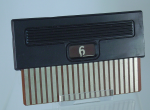
|

|
| Magnavox Odyssey Multicard | 110 [1] | 105 | 15 | 105mm wide and 15mm thick at widest/thickest point of the 3D printed handle. The PCB is 90mm wide. | TheRealOC | 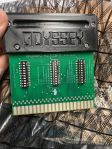
|

|
| Magnavox Odyssey Series of Consoles | N/A | N/A | N/A | The Odyssey Series of dedicated consoles were limited to a fixed number of built-in games and were not equipped for additional games that are distributed via ROM cartridges, discs, downloads or other digital media. | TheRealOC | 
|

|
| TV Tennis Electrotennis (Epoch) | N/A | N/A | N/A | The Electrotennis was a dedicated console (i.e. with game(s) built in), which was not equipped for additional games that are distributed via ROM cartridges, discs, downloads or other digital media. | TheRealOC | 
|

|
| Atari Home Pong | N/A | N/A | N/A | Both models of Atari Home Pong (the C-100 and the C-140) were dedicated consoles, limited to a fixed number of built-in games and were not equipped for additional games that are distributed via ROM cartridges, discs, downloads or other digital media. | TheRealOC | 
|
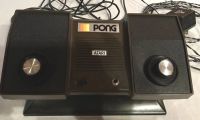
|
| Coleco Telstar Series | N/A | N/A | N/A | The Coleco Telstar Series of dedicated consoles were limited to a fixed number of built-in games and were not equipped for additional games that are distributed via ROM cartridges, discs, downloads or other digital media. The one exception was the Coleco Telsar Arcade console. | TheRealOC | 
|
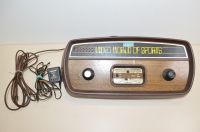
|
| Coleco Telstar Arcade cartridges | ? | ? | ? | This could arguably be said to be the first "true" cartridge for a home gaming console. Whereas the earlier Magnavox Odyssey game cards merely turned on or off certain electronics inside the console (like a set of switches or jumpers), the Telstar Arcade cartridge actually contained small 512-word programs in ROM. The cartridge has a unique triangular shape which connects on the top of the Telstar Arcade console. | ? | 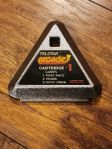
|
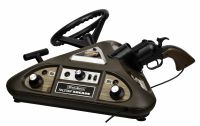
|
| Nintendo Color TV - Game 6 | N/A | N/A | N/A | The Nintendo Color TV-Game Series of consoles were all dedicated consoles with games built-in; they were not equipped for additional games that are distributed via ROM cartridges, discs, downloads or other digital media. | TheRealOC | 
|
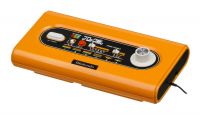
|
Second generation of consoles
| Console | Height (mm) | Width (mm) | Thickness (mm) | Notes | Confirmed by | Images | |
|---|---|---|---|---|---|---|---|
| Atari 2600 | 98 | 82 | 20 | ? | Black Majic (talk) | 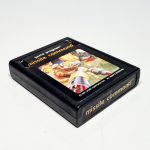
|
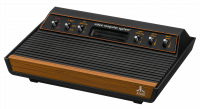
|
| Sears Video Arcade II/Atari 2800 | ? | ? | ? | ? | ? | ? | ? |
| Magnavox Odyssey 2 | 127 | 80 | 21 | The cartridges are in chunky plastic casings with a handle to make removal easier, and in Europe they were typically boxed in hard plastic cases with a combined manual and inlay providing cover art. | Reddit User: gsx115 | 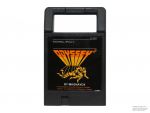
|
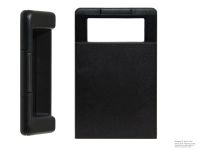
|
| Philips Videopac G7000 (European release of the Magnavox Odyssey 2) | 127 | 80 | 21 | The cartridges for the PAL and NTSC versions of the console (Magnavox Odyssey 2 and Videopac G7000 respectively) are the same size and shape; anecdotally the Videopac carts have a more crisp casting (and possibly molding).
The American Odyssey 2 cards have a more rounded-ness to the straight edge. It's possible the mould for the Odyssey 2 cards was made by taking a mould of one of the Videopac carts in much the same way we see similar sculpts degradation in other bootleg cards and toys. |
Avon Fox (www.the-liberator.net) | 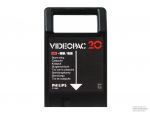
|
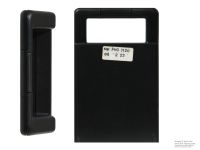
|
| Mattel Intellivision | 88 | 68 | 16 | ? | Black Majic (talk) | 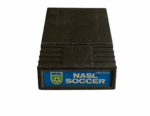
|
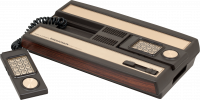
|
| Mattel Intellivision II | 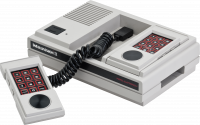
| ||||||
| Epoch Cassette Vision | ? | ? | ? | ? | ? | ? | 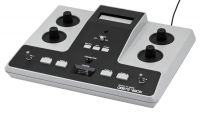
|
| Coleco ColecoVision | 87 | 81 | 19 | ? | Reddit User: gsx115 | 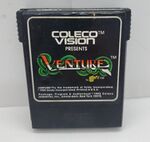
|

|
| Atari 5200 | 112 | 104 | 20 | ? | Reddit User: gsx115 | ? | 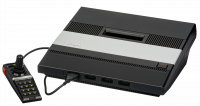
|
| GCE/MB Vectrex | 71,5 | 74,5 | 22,8 | All Cartridges for the original games looks the same from the outside. There are two main revisions of the cartridge interior plus two odd types used for specific releases. The two main revisions are the "normal" version used for most games and the made in Ireland versions. The normal version shell suspends the PCB by five pegs that corresponds to holes in the PCB and the two shell halves are held together by a single screw from the back, while the made in IRE shell was changed for cost savings probably. The IRE cartridges omitted the screw connection and the shell was instead glued shut. The IRE PCBs were significantly smaller than the normal ones and the PCB suspension was also changed so that the PCB had notches that would latch onto the thin and fragile front wall in the mouth of the shell (which breaks easily). The odd type shells were yet another type of shell with some minor differences used for the 3D Imager games and Mine Storm II and sometimes Pole Position. The last odd shell type was used for AnimAction because that PCB was much bigger and had more components so that shell is more hollow inside to make room for the larger PCB. | ? | ? | 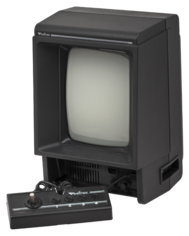
|
Third generation of consoles
| Console | Height (mm) | Width (mm) | Thickness (mm) | Notes | Confirmed by | Images | |
|---|---|---|---|---|---|---|---|
| Nintendo Entertainment System (US) * | 134 | 120 | 17 | All officially licensed NTSC-U and PAL region cartridges are the same dimensions. Early NES Game Paks are held together with 5 small, slotted screws. | Black Majic (talk) | 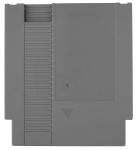
|
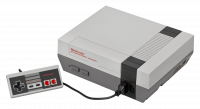
|
| Nintendo Entertainment System (PAL) * | 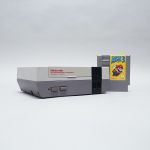
| ||||||
| Famicom * | 108 | 71 | 17 | ? | Reddit User: gsx115 | 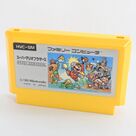
|

|
| AV Famicom * | ? | ? | 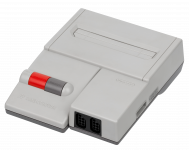
| ||||
| Famicom Disk System * | ? | ? | ? | ? | ? | ? | 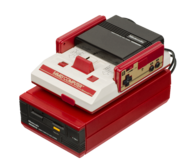
|
| Twin Famicom * | ? | ? | ? | ? | ? | ? | 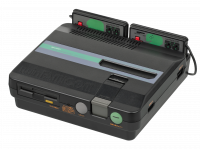
|
| Sega SG-1000 * | ? | ? | ? | ? | ? | ? | 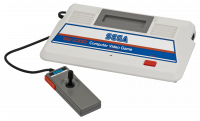
|
| SG-1000 Multicart (Survivors MegaCart) | 106 | 82 | 20 | ? | TheRealOC | 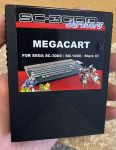
|

|
| Sega Mark III * | ? | ? | ? | ? | ? | ? | 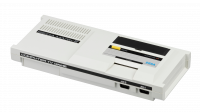
|
| Sega Master System Cartridge | 69 | 108 | 16 | ? | Bomb Bloke | 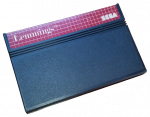
|
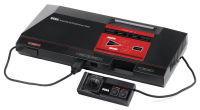
|
| Sega Master System (JP, MK-2000) * | ? | ? | ? | ? | ? | ? | ? |
| Atari 7800 | 87 | 81 | 19 | ? | Reddit User: gsx115 | ? | 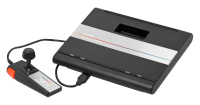
|
| Casio PV-1000 * | ? | ? | ? | ? | ? | ? | 
|
| Epoch Super Cassette Vision * | ? | ? | ? | ? | ? | ? | ? |
| Amstrad GX4000 * | ? | ? | ? | ? | ? | ? | 
|
Fourth generation of consoles
| Console | Height (mm) | Width (mm) | Thickness (mm) | Notes | Confirmed by | Images | |
|---|---|---|---|---|---|---|---|
| Atari Lynx | 61 | 58 | 2.4/16 | ? | karri[2] | 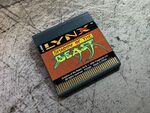
|
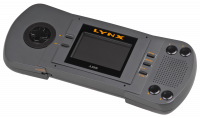
|
| NEC TurboGrafx-16 HuCard/TurboChip | 84 | 53 | 2 | ? | ApolloBoy | 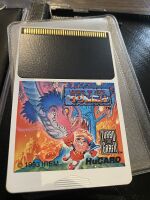
|
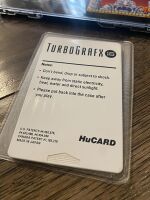
|
| Standard PC Engine HuCard | 84 | 53 | 2 | Most PC Engine HuCards are physically identical to their TG-16 counterparts but have a different pinout | Reddit User: gsx115 | 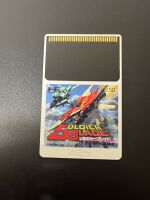
|
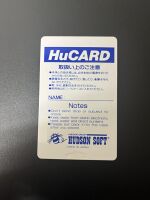
|
| NEC PC Engine SuperGrafx HuCard | 84 | 53 | 2 | Same as the PC Engine but the label is flipped around as HuCards are loaded into the rear of the console | ApolloBoy | 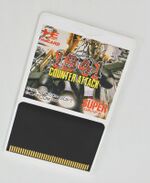
|
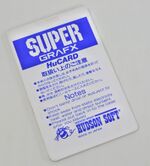
|
| System Card (v1.0) for the: | 84 | 53 | 2 | The PC Engine CD add-on uses disc-based physical media, however a special HuCard called the "PC Engine CD System Card (v1.0)" is required to provide the unit's OS. The 3.0 system card and Arcade Card Pro add additional RAM in addition to the OS. | ApolloBoy / Cyrus Martin | 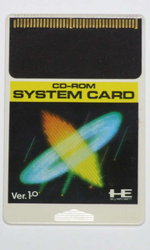
|
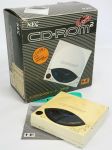
|
| NEC PC Engine CD | |||||||
| System Card (v2.0) for the: | 84 | 53 | 2 | The TurboGrafx-CD add-on uses disc-based physical media, however a special Turbochip card called the "TurboGrafx CD System Card" (version 2.0) is required to provide the unit's OS as well as additional RAM. | ApolloBoy / Cyrus Martin | 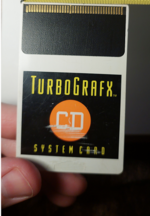
|
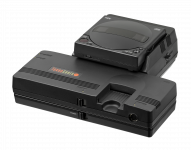
|
| NEC TurboGrafx-CD | |||||||
| Super System Card (v3.0) for the: | 84 | 53 | 2 | When NEC started using the Super CD format, they released an upgraded version 3.0 Super System Card. This also is meant to be plugged into the American TurboGrax-16, allowing the TurboGrax-CD unit to play the 2MB upgraded Super CD games, as well as the the regular TurboGrafx-CD games.
Note: The Super System (v3.0) is pre-built into the TurboDuo consoles, so the separate card is not required by these systems to play 1.0, 2.0 or 3.0 CD games. |
ApolloBoy / Cyrus Martin | 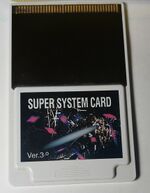
|

|
| NEC TurboGrafx-CD | |||||||
| Street Fighter 2 Hucard for the PC Engine | 84 | 53 | 2 | Street Fighter II for the PC Engine system, was produced on a 20Mbits cartridge, making it the largest HuCard game ever created. It was also physically larger than standard Hucards (the footprint is the same but the black end is raised. Other later carts copied this style and had different sized black areas but this did not affect the overall size of the card.
Continuing to produce similar arcade ports for the PC Engine created the impetus for creating the Arcade System Card. |
Cyrus Martin | 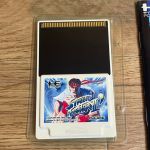
|

|
| Arcade System Card (Duo Version) for: | 84 | 53 | 2 | To achieve high-quality ports of arcade fighting games, more RAM was needed and so NEC created a system card capable of providing it. This was called the “Arcade System Card”. There were two different versions – the Duo version and the Pro version (which was designed in case the user didn’t have a Duo). | Cyrus Martin | 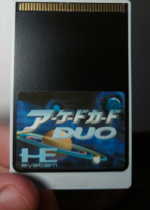
|
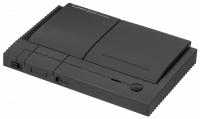
|
| NEC PC Engine Duo-R/Duo-RX | 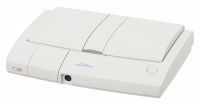
| ||||||
| and NEC Super CD-ROM2 | 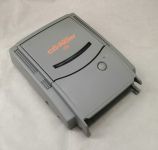
| ||||||
| Arcade System Card (Pro Version) for the: | 84 | 53 | 2 | To achieve high-quality ports of arcade fighting games, more RAM was needed and so NEC created a system card capable of providing it. This was called the “Arcade System Card”. There were two different versions – the Duo version and the Pro version (which was designed in case the user didn’t have a Duo) | ApolloBoy / Cyrus Martin | 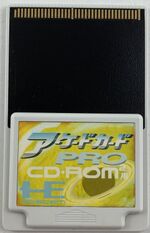
|

|
| and NEC Super CD-ROM2 | 
| ||||||
| NEC TurboExpress/PC Engine GT | 84 | 53 | 2 | The NEC TurboExpress/PC Engine GT are not unique consoles with their own dedicated games library. Rather they are miniaturized versions of the existing TurboGrafx-16 and PC Engine consoles, and uses the same TurboChips and HuCards respectively. | RifeXD (YouTube) | 
|
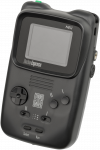
|
| NEC TurboDuo/PC Engine Duo | 84 | 53 | 2 | The TurboDuo integrates the capabilities of the TurboGrafx-16 and the TurboGrafx-CD) into a single, redesigned unit. The PC Engine Duo does the same for the Japanese PC Engine and the Super CD-ROM2.
However, neither the TurboDuo nor PC Engine Duo any additional hardware on the TurboChip/HuCard side - standard TurboChips/HuCards are used in the US and Japanese versions, respectively. |
ApolloBoy | 
|

|
| NEC Super CD-ROM2 | N/A | N/A | N/A | Console uses disc-based physical media | ApolloBoy | 
| |
| NEC PC Engine LT | 84 | 53 | 2 | Similarly to the PC Engine GT, the PC Engine LT uses the same HuCards as a standard Japanese PC Engine home console (the LT was released exclusively in Japan, and does not support American TurboChips). The LT did not receive any of its own unique HuCard titles. | ApolloBoy | 
|
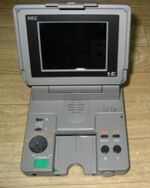
|
| NEC PC Engine Duo-R/Duo-RX | 84 | 53 | 2 | The Duo-R and Duo-RX are Japan-only cost reduced models of the PC Engine Duo. Again, they both use standard HuCards. | Zaxour | 
|

|
| Standard Sega Mega Drive Japanese Cartridges | 67 | 93 | 17 | The PCBs are always ~83 mm since the receiver is around 85 mm. Japanese carts have a rectangular footprint 93 mm wide, 67 mm tall, 17 mm thick with rounded edges; the top and sides of the cart are also rounded, with the left side of the cart having an indentation (for locking the cart while the console is powered). | NagaTen | 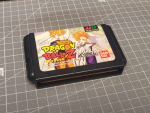
|
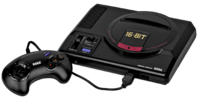
|
| Standard PAL Sega Mega Drive Cartridges | 70 | 109 | 17 | Genesis and PAL Mega Drive carts share the same mold; their footprint goes from a rectangular 95 mm wide shape and widens into 108 mm with rounded sides, 67 mm tall and 17 mm thick, with chamfered edges. Only the sides of the cart are rounded, with the top being being flat, and there is no indentation since consoles outside Japan don't have a cart locking mechanism. | NagaTen | 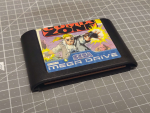
|

|
| Standard NTSC Sega Genesis Cartridges | 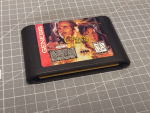
|
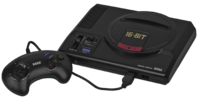
| |||||
| Sega Genesis/Mega Drive Virtua Racing Cartridge | 108 | 109 | 17 | ? | Black Majic (talk) | 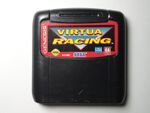
|
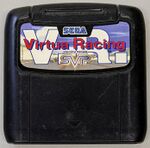
|
| Sega Genesis Acclaim Cartridges | 67 | 95/108 | 17 | Adam Koralik | 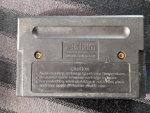
|

| |
| Sega Genesis EA (Electronic Arts) Cartridges | 88 | 95 | 17 | Electronic Arts reverse-engineered the Genesis and produced their own (taller) carts, which were notable for the large indentation with a yellow plastic section with the EA logo molded onto it. Cartridges have flat edges at the bottom, a flat top and chamfered/slightly rounded sides. | NagaTen | 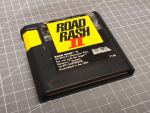
|
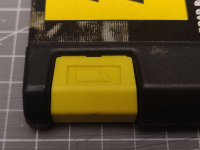
|
| Standard Sega 32X PAL Cartridge | 111 | 72 | 16 | Aside from text which is written into the mold, 32X carts share the same mold; the design is consistent across all regions. Unlike the Japanese Mega Drive there is no cartridge lock, but there are also no end labels. | Reddit User: gsx115 | 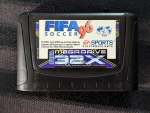
|
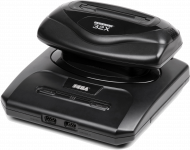
|
| Standard Sega 32X NTSC-U Cartridge | 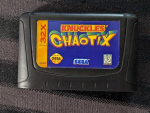
|

| |||||
| Standard Sega 32X NTSC-J Cartridge | 
|

| |||||
| Sega Mega Drive Codemasters Cartridge | 75 | 98/65 | 17 | Codemasters cartridge (without controller ports) are 98mm wide at the bottom, tapering away to 65mm at the top. These carts have flat edges, a flat top and rounded sides. | NagaTen | 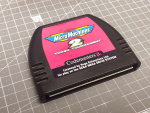
|

|
| Sega Mega Drive Codemasters "J-Cart" Cartridge (with controller ports) | 75 | 98/65 | 17 | J-Carts are exactly the same as standard Codemasters cartridges, but with two front-facing 9-pin controller ports labelled "Control 3" and "Control 4". Genesis version is identical to PAL version. | NagaTen, Adam Koralik | 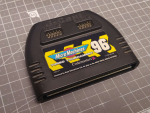
|

|
| Sega Genesis Codemasters "J-Cart" Cartridge (with controller ports) | 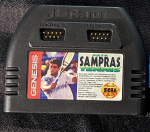
|
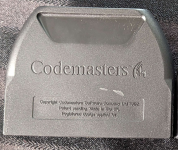
| |||||
| Sega Genesis/Mega Drive Sonic and Knuckles cartridge | 84 (incl. cover) | 121.65 (at hinges) | 22 | "Sonic 3" and "Sonic & Knuckles" were originally conceived as a single game, however ROM size constraints meant that the game had to be split into two separate parts. The "Sonic & Knuckles" cart was used for all regions, and is an identical shape to a standard PAL Mega Drive/Genesis cartridge at the bottom (with a "cut" on the left side of the cart for compatibility with the Japanese cart-locking mechanism).
However, the top of the cart has a swiveling cover called a "Lock-On Adapter", which allows the player to connect another cartridge on top. The footprint of the cartridge goes from a 95mm wide shape and widens into 116mm at the top, while the thickness goes from 17mm to 22mm. |
Black Majic (talk) | 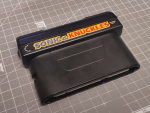
|
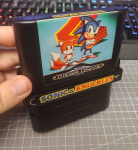
|
| Mega Key region converter cartridge | 67 | 95/108 | 17 | This is an unofficial region bypass cartridge that uses DIP switches to convert cartridges from any region (USA/Japan/Brazil/PAL+SECAM) to work with a Sega Genesis/Mega Drive console from any region. As with standard cartridges, the Mega Key footprint goes from a rectangular 95 mm wide shape and widens into 108 mm.
The cartridge being converted would sit on top of an adapter which is 87 mm wide and 9 mm thick. The Mega Key cart itself is 67 mm tall, but 127 mm with a regular cart on top. Despite the grey area around the concept of the cart, this was actually officially distributed in Portugal, by Ecofilmes (see Wikipedia @ shorturl.at/sDEFJ) |
NagaTen | 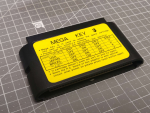
|
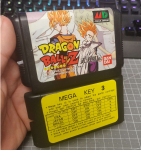
|
| Sega Game Gear * | 68 | 66 | 10 | ? | Reddit User: gsx115 | 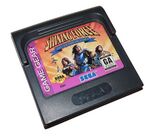
|
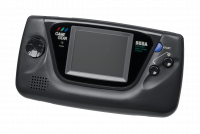
|
| Nintendo Game Boy | 65 | 57 | 7.8 | ? | Black Majic (talk) | 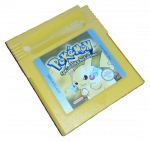
|
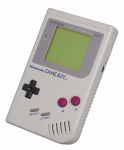
|
| Nintendo Game Boy Pocket | 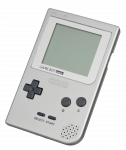
| ||||||
| Super Nintendo (US) | 87.7 | 135.85 | 19.7 | ? | Black Majic (talk) | 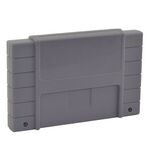
|
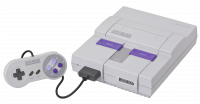
|
| Super Famicom | 86 | 127 | 20 | PAL and Japanese cartridge casings are identical, with the exception of the base from which the PCB protrudes. | Bomb Bloke | 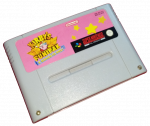
|

|
| Super Nintendo (PAL) * | 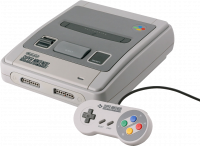
| ||||||
| SNK Neo Geo AES | 146.05 | 190.5 | 31.75 | ? | Reddit User: protocephalon | 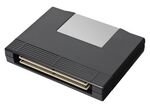
|

|
| SNK Neo Geo CD | N/A | N/A | N/A | Console uses disc-based physical media | ? | 
| |
| Pioneer LaserActive | N/A | N/A | N/A | Console uses laserdisc-based physical media. However Pioneer and Sega released an add-on PAC (the Mega LD PAC) that allows player to play 8-inch and 12-inch LaserActive Mega LD discs, in addition to standard Sega CD discs and Genesis cartridges, as well as CD+G discs. | ? | 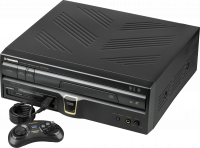
| |
Fifth generation of consoles
| Console | Height (mm) | Width (mm) | Thickness (mm) | Notes | Confirmed by | Images | |
|---|---|---|---|---|---|---|---|
| Commodore Amiga CD32 | N/A | N/A | N/A | Console uses disc-based physical media | TheRealOC | 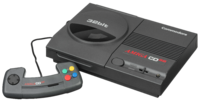
| |
| Panasonic 3DO | N/A | N/A | N/A | Console uses disc-based physical media | TheRealOC | 
| |
| Atari Jaguar * | 88.4 | 108.0 | 19.5 (max) | ? | Zerosquare[3] | 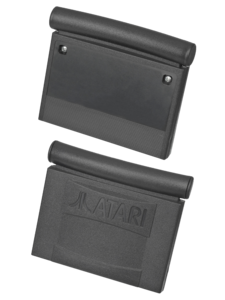
|

|
| Atari Jaguar CD | N/A | N/A | N/A | Console uses disc-based physical media | TheRealOC | 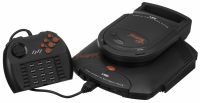
| |
| Bandai Playdia | N/A | N/A | N/A | Console uses disc-based physical media | TheRealOC | 
| |
| Sega Saturn | ? | ? | ? | The Saturn used disc-based physical media for its gaming library. However, the console also features a prominent cartridge slot, which was primarily used to expand the console's storage and RAM, as well as cartridge-based accessories such as the Sega Net Link modem. | ? | 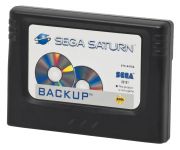
|
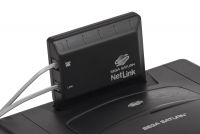
|
| Sony PlayStation | N/A | N/A | N/A | Console uses disc-based physical media | TheRealOC | 
| |
| Sony PSone | TheRealOC | 
| |||||
| NEC PC-FX | N/A | N/A | N/A | Console uses disc-based physical media | Nadaman | 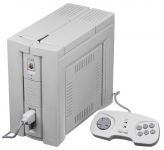
| |
| Casio Loopy | ? | ? | ? | ? | ? | ? | 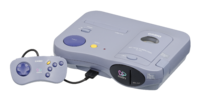
|
| Apple Pippin | N/A | N/A | N/A | Console uses disc-based physical media | ? | 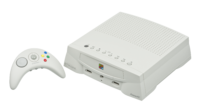
| |
| Nintendo 64 | 76.6 | 116 | 18.5 | ? | Reddit User: gsx115 | 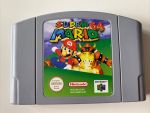
|

|
| Nintendo Nintendo Virtual Boy | 68.36 | 75.8 | 6.61 | The Virtual Boy was never released in PAL regions; the NTSC-U and NTSC-J cartridges are identical, with the only different carts being the HyperFlash32, HyperBoy, and Flash Boy. The cartridge is 73.74 mm tall when including the dust cap. | Virtual Girl (Candi's Classic Game Shrine) | 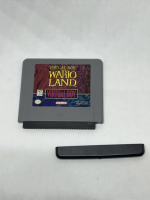
|
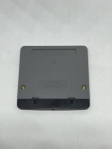
|
| Nintendo Game Boy Color | 65.5 | 57 | 9 | Game Boy Color cartridges now feature a transparent shell with various colors and have similar dimensions to the original non-color cartridges, but they no longer have a ridge in the upper corner of the cartridge, which prevents them from allowing an original Game Boy to turn on with a Game Boy Color cartridge inserted. | Reddit User: gsx115 | 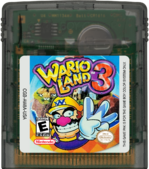
|
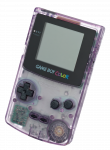
|
Sixth generation of consoles
| Console | Height (mm) | Width (mm) | Thickness (mm) | Notes | Confirmed by | Images | |
|---|---|---|---|---|---|---|---|
| Nintendo Game Boy Advance | 60 | 35 | 9 | With the exception of the Micro, Game Boy Advance consoles also support Game Boy and Game Boy Color cartridges. | Reddit User: gsx115 | 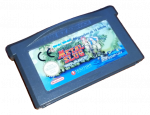
|
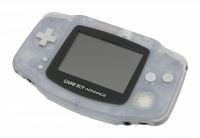
|
| Nintendo Game Boy Advance SP | 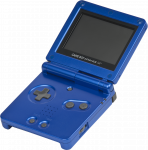
| ||||||
| Nintendo Game Boy Micro | 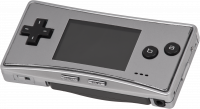
| ||||||
| Sega Dreamcast | N/A | N/A | N/A | Console uses disc-based physical media | TheRealOC | 
| |
| Sony PlayStation 2 | N/A | N/A | N/A | Console uses disc-based physical media | TheRealOC | 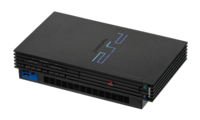
| |
| Sony PlayStation 2 ("slim", SCPH-7xxxx) | TheRealOC | 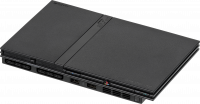
| |||||
| Sony PlayStation 2 ("slim", SCPH-900xx) | TheRealOC | 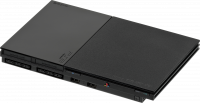
| |||||
| VM Labs Nuon | N/A | N/A | N/A | Console uses disc-based physical media | TheRealOC | 
| |
| Microsoft Xbox | N/A | N/A | N/A | Console uses disc-based physical media | TheRealOC | 
| |
| Nintendo GameCube | N/A | N/A | N/A | The main media used by the Gamecube are "Gamecube Game Discs". However, the console can also play Game Boy, Game Boy Color, and Game Boy Advance cartridges, via the Game Boy Player accessory. For more information about those cartridges, see the entries for those devices on this page. | TheRealOC | 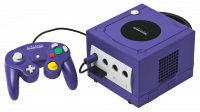
| |
Seventh generation of consoles
| Console | Height (mm) | Width (mm) | Thickness (mm) | Notes | Confirmed by | Images | |
|---|---|---|---|---|---|---|---|
| Nintendo DS | 35 | 33 | 3.8 | Reddit User: gsx115 | 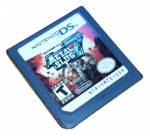
|
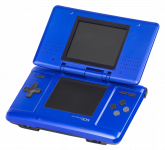
| |
| Nintendo DS Lite | 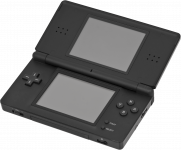
| ||||||
| Nintendo DSi series | DSi exclusive cartridge games such as Foto Showdown will have a white color instead of the typical dark gray color. They are otherwise extremely similar, with the DSi consoles retaining backwards compatiblity with DS games. | 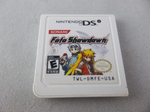
|
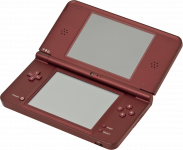
| ||||
| Sony PSP (except N1000/Go) | N/A | N/A | N/A | Console uses proprietary disc-based physical media | Glitchgod | 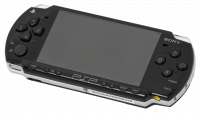
| |
| Sony PSP-N1000 series (Go) | N/A | N/A | N/A | Console does not use physical media | Glitchgod | 
|
|
| Nintendo Wii | N/A | N/A | N/A | Console uses disc-based physical media | Glitchgod | ||
| Mattel HyperScan | ? | ? | ? | The console uses disc-based physical media for its games, but Mattel were attempting to combine video-gaming with collecting trading cards. To that end, packs of randomized trading cards were bundled with the games (and also sold separately), and the console contained an RFID scanner which could read swipes from these cards while the game was playing. The function of these cards included character selection, as well as enhancing the character's abilities. | ? | 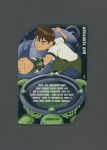
|

|
| Microsoft Xbox 360 | N/A | N/A | N/A | Console uses disc-based physical media | TheRealOC | 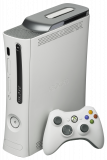
| |
| Microsoft Xbox 360 S | TheRealOC | 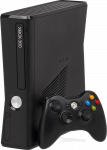
| |||||
| Microsoft Xbox 360 E | TheRealOC | 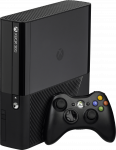
| |||||
| Sony PlayStation 3 | N/A | N/A | N/A | Console uses disc-based physical media | TheRealOC | 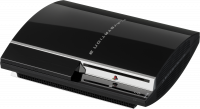
| |
| Sony PlayStation 3 "Slim" | TheRealOC | 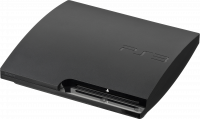
| |||||
| Sony PlayStation 3 "Super Slim" | TheRealOC | 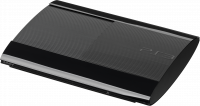
| |||||
Eighth generation of consoles
| Console | Height (mm) | Width (mm) | Thickness (mm) | Notes | Confirmed by | Images | |
|---|---|---|---|---|---|---|---|
| Nintendo 3DS/2DS Series incl. New | 35 | 33 | 3.8 | Cartridges are nearly identical to the DS ones, but with a small ridge on the corner to prevent it being inserted in a DS or DSi. | Reddit User: gsx115 | 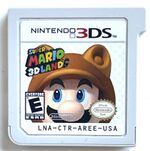
|
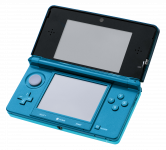
|
| Sony PS Vita (PCH-1xxx) | 30 | 22 | 2 | Some PS Vita cartridges have a small grw0: partition with write access for save data on the cartridge, like the 3DS. | Reddit User: gsx115 | 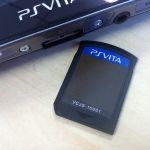
|
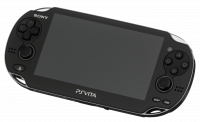
|
| Sony PS Vita TV | 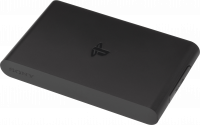
| ||||||
| Sony PS Vita (PCH-20xx) | 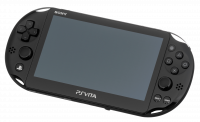
| ||||||
| Nintendo Wii U | N/A | N/A | N/A | Console uses proprietary disc-based physical media | TheRealOC | 
| |
| Sony PlayStation 4 | N/A | N/A | N/A | Console uses disc-based physical media | TheRealOC | 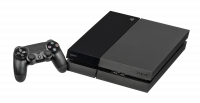
| |
| Sony PlayStation 4 "Slim" | TheRealOC | 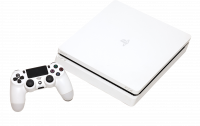
| |||||
| Sony PlayStation 4 Pro | TheRealOC | 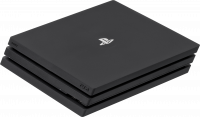
| |||||
| Microsoft Xbox One | N/A | N/A | N/A | Console uses disc-based physical media | TheRealOC | 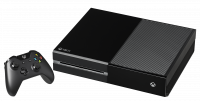
| |
| Microsoft Xbox One S | TheRealOC | 
| |||||
| Microsoft Xbox One X | TheRealOC | 
| |||||
| Nintendo Switch Game Cards | 31 | 21 | 3 | ? | Unconfirmed | 
|
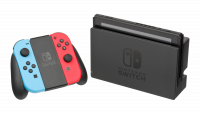
|
Ninth generation of consoles
| Console | Height (mm) | Width (mm) | Thickness (mm) | Notes | Confirmed by | Images | |
|---|---|---|---|---|---|---|---|
| Sony PlayStation 5 | N/A | N/A | N/A | Console uses disc-based physical media | TheRealOC | 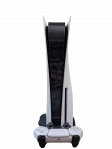
| |
| Sony PlayStation 5 Digital Edition | N/A | N/A | N/A | Console does not use physical media | TheRealOC | 
|

|
| Microsoft Xbox Series S | N/A | N/A | N/A | Console does not use physical media | TheRealOC | 
|
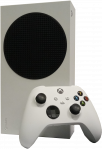
|
| Microsoft Xbox Series X | N/A | N/A | N/A | Console uses disc-based physical media | TheRealOC | 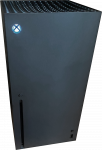
| |
References
- ↑ https://forums.atariage.com/topic/332013-does-any-place-make-or-sell-custom-cases-that-would-fit-this-magnavox-odyssey-multicard/#comment-5014407
- ↑ https://forums.atariage.com/topic/240309-what-are-the-measurements-of-the-cartridges-for-the-lynx/#comment-3273491
- ↑ https://forums.atariage.com/topic/347627-atari-jaguar-cartridge-dimensions/

